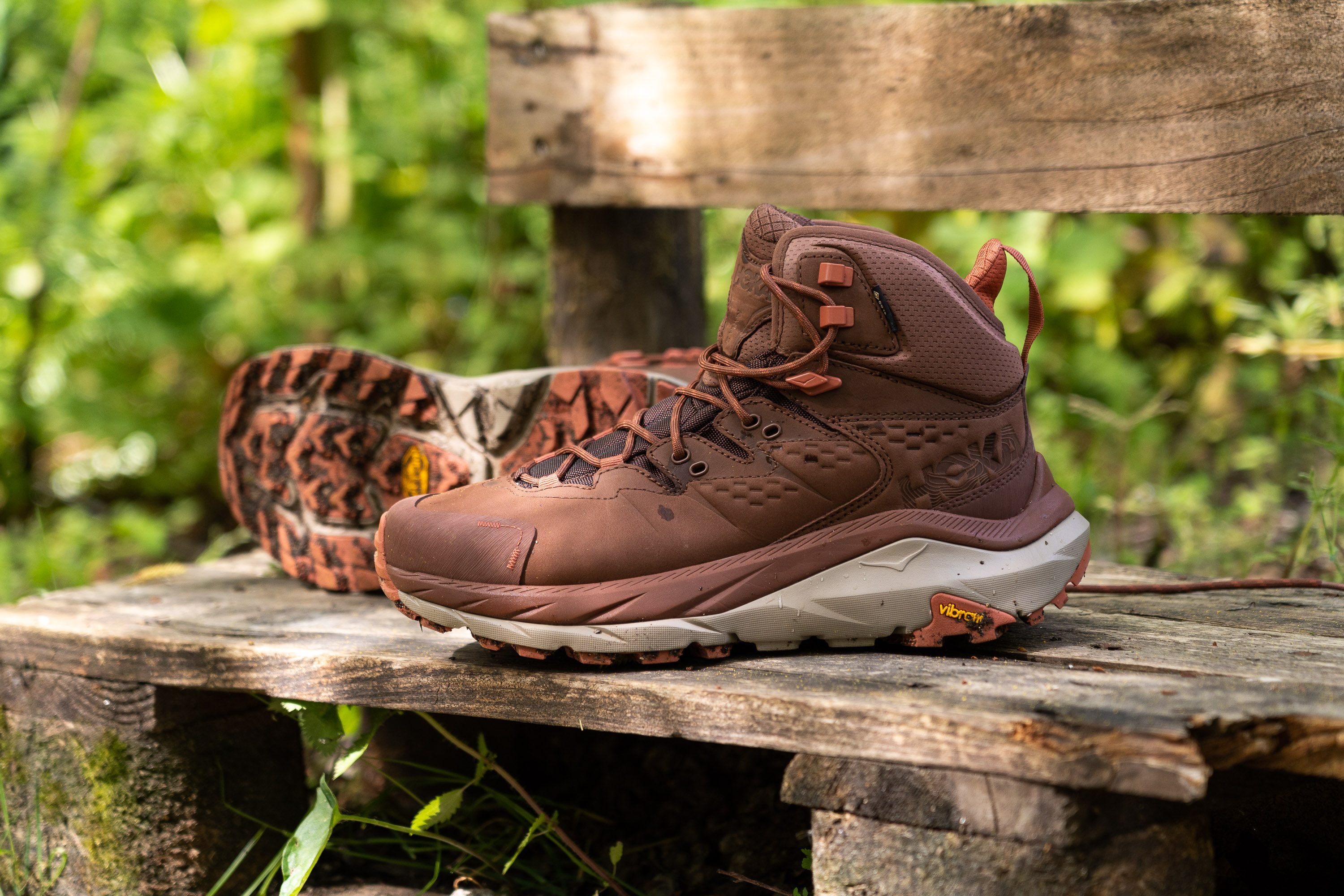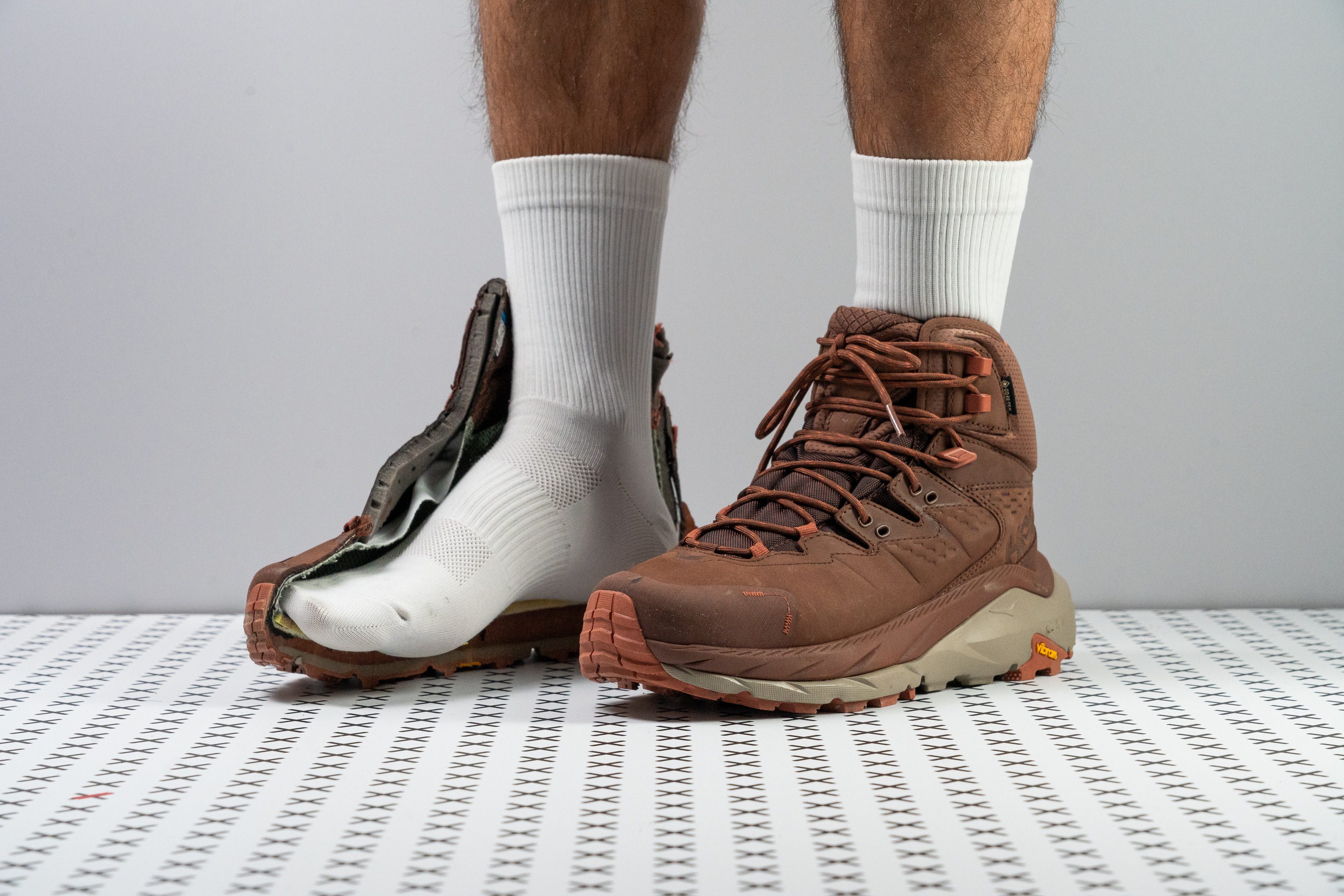Our verdict
- Top pick in best lightweight waterproof hiking boots (2023)
- Top pick in best hiking boots for women (2024)
Pros
- Sky-high comfort level
- Excellent waterproofing
- High-quality materials
- Pain-alleviating support
- Smooth heel-to-toe transitions
- Incredibly stable
- Superb grip
- Surprisingly light
- Minimal break-in period
- Includes sustainable materials
Cons
- Short tongue (laces slip and cause pressure)
- Bulky heel gets stuck in stones
- Polarizing aesthetics
Audience verdict
Comparison
The most similar hiking boots compared
+ + Add a shoe | |||||
|---|---|---|---|---|---|
| Audience score | 83 Good! | 80 Good! | 84 Good! | 90 Great! | |
| Price | $240 | $240 | $160 | $255 | |
| Trail terrain | Moderate | Moderate | Moderate | Technical | |
| Shock absorption | High | High | Low | Moderate | |
| Energy return | Low | Moderate | Moderate | High | |
| Weight lab Weight brand | 18.5 oz / 525g 16.8 oz / 476g | 19.4 oz / 550g 20 oz / 567g | 19.9 oz / 563g | 21.1 oz / 597g 19.5 oz / 553g | |
| Breathability | Warm | Warm | Warm | Warm | |
| Use | BackpackingDay HikingSnow | BackpackingDay Hiking | BackpackingDay HikingSnowBeginners | BackpackingDay HikingSnow | |
| Orthotic friendly | ✓ | ✓ | ✓ | ✓ | |
| Drop lab | 11.2 mm | 11.5 mm | 16.4 mm | 17.2 mm | |
| Size | True to size | Slightly small | Slightly small | True to size | |
| Midsole softness | Soft | Soft | Firm | Balanced | |
| Difference in midsole softness in cold | Normal | Big | Small | Small | |
| Heel counter stiffness | Flexible | Stiff | Stiff | Flexible | |
| Stiffness | Moderate | Moderate | Flexible | Moderate | |
| Outsole hardness | Average | - | Average | Average | |
| Waterproofing | Waterproof | Waterproof | Waterproof | Waterproof | |
| Material | Leather | Leather | LeatherMesh | Leather | |
| Season | Winter | Winter | Winter | Winter | |
| Toebox durability | Good | Decent | Bad | Good | |
| Heel padding durability | Good | Decent | Bad | Decent | |
| Outsole durability | - | Bad | Decent | Decent | |
| Width / fit | Narrow | Medium | Medium | Medium | |
| Toebox width | Medium | Medium | Medium | Narrow | |
| Lug depth | 4.9 mm | 3.2 mm | 4.6 mm | 5.1 mm | |
| Heel stack lab | 39.3 mm | 41.9 mm | 38.7 mm | 37.8 mm | |
| Forefoot | 28.1 mm | 30.4 mm | 22.3 mm | 20.6 mm | |
| Widths available | Normal | Normal | Normal | NarrowNormalWide | |
| Technology | Gore-TexVibram | Gore-TexVibram | - | Gore-TexVibram | |
| Cut | Mid cut | Mid cut | Mid cut | Mid cut | |
| Removable insole | ✓ | ✓ | ✓ | ✓ | |
| Ranking | #33 Bottom 26% | #37 Bottom 9% | #26 Bottom 36% | #7 Top 18% | |
| Popularity | #15 Top 34% | #4 Top 10% | #37 Bottom 9% | #16 Top 40% |
Who should buy
In our opinion, the Hoka Kaha 2 GTX is a good match for hikers who:
- want a premium-quality leather boot that will last more than a season
- need a backpacking-ready pair of boots
- search for the highest level of waterproofing
- prefer more athletic-looking hiking footwear
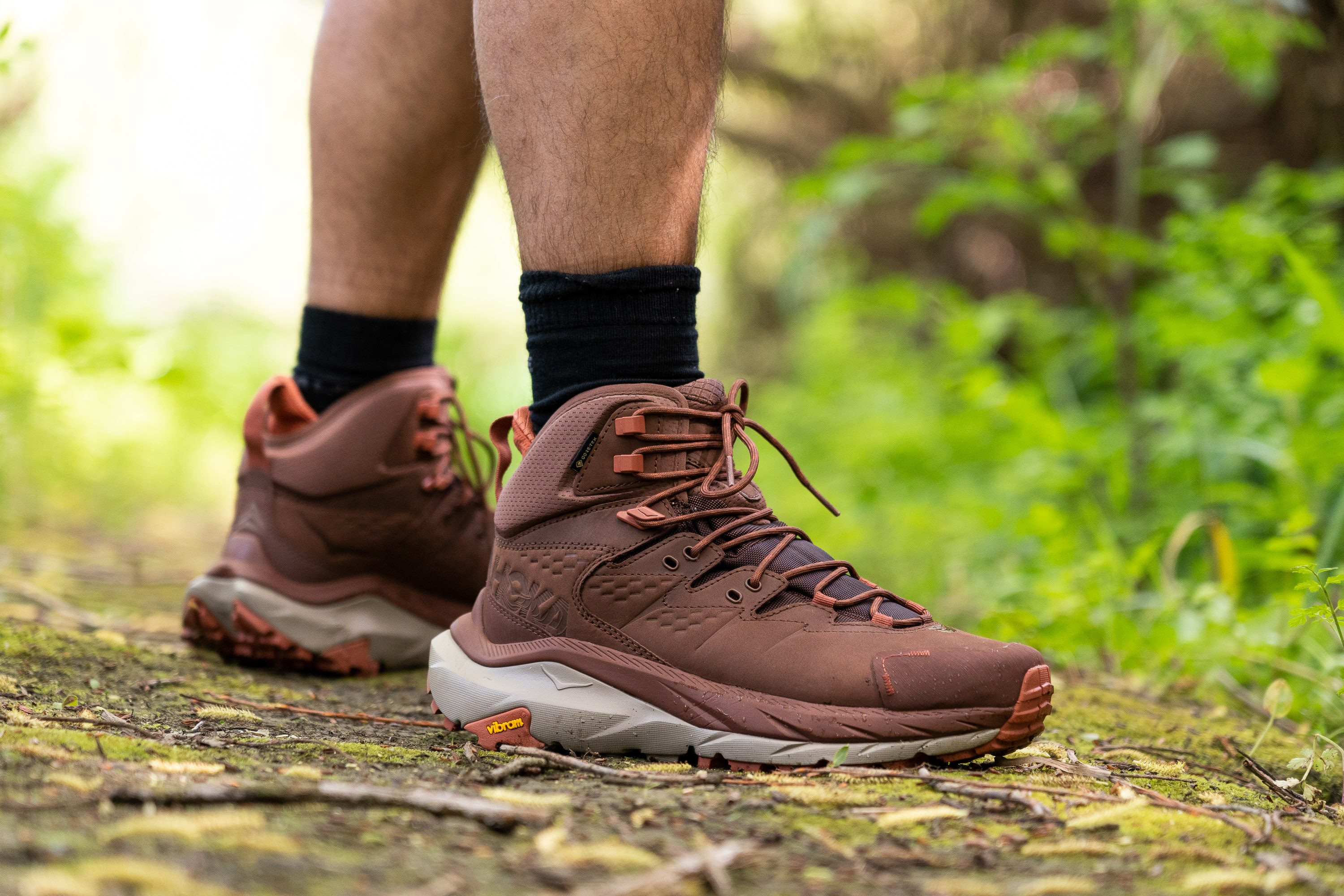
Who should NOT buy
If you are concerned about the boot's short tongue and bulky heel, we recommend the Salomon Quest 4 instead. It is heavier but it is also free from the pitfalls of the Kaha 2 GTX.
You might as well consider the more affordable Hoka Anacapa boot. It may not have the same support and materials, but it is an excellent day hiking boot. And it costs a whole $55 less.
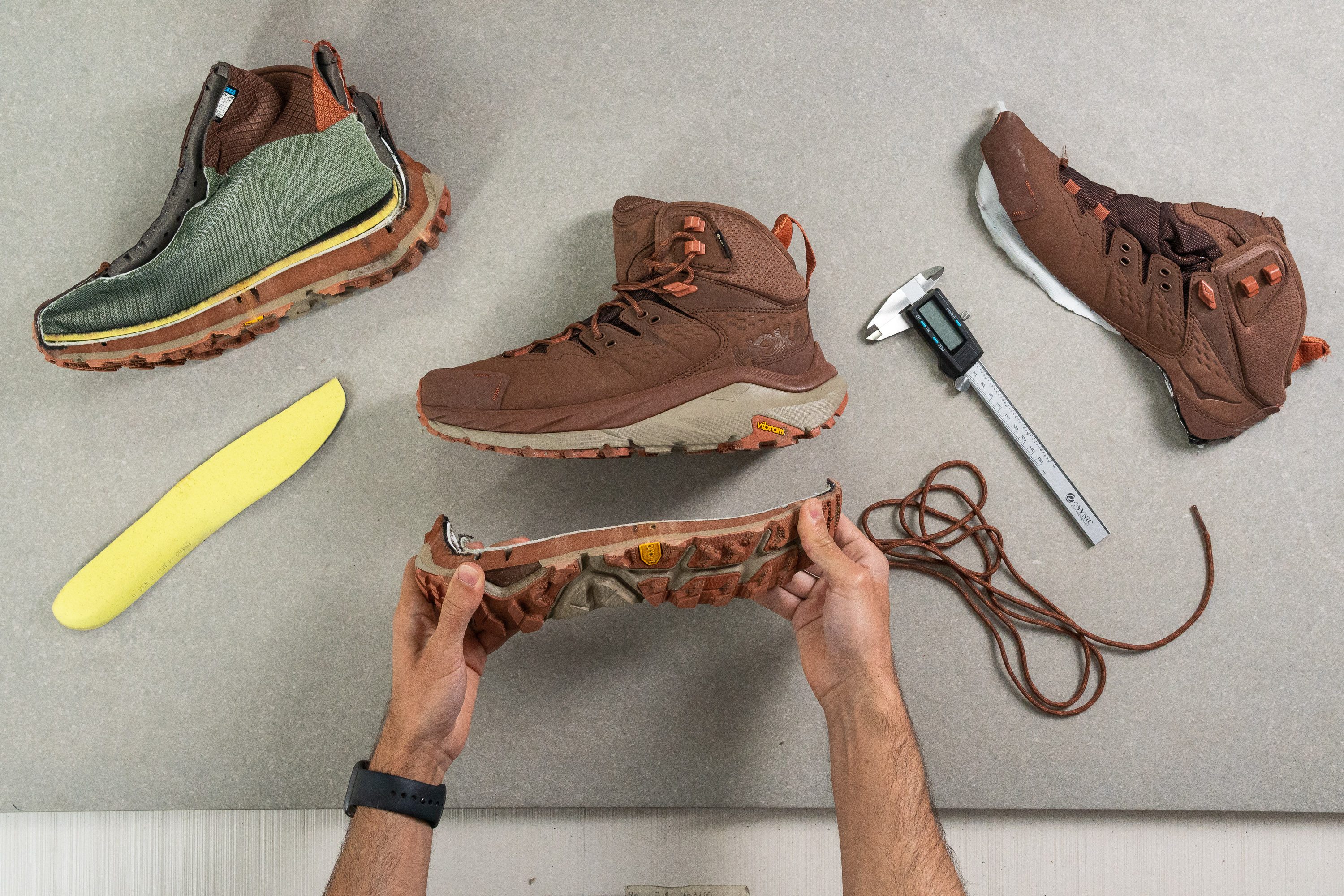
Cushioning
Shock absorption
The amount of cushioning in the HOKA Kaha 2 GTX feels bottomless, and it is reflected in the boot's high shock absorption measurement of 114 SA.
There is plenty of impact protection and comfort for any distance you choose to cover on a given hike. After a full day of rocking the trails, our feet remained fresh and free from fatigue.
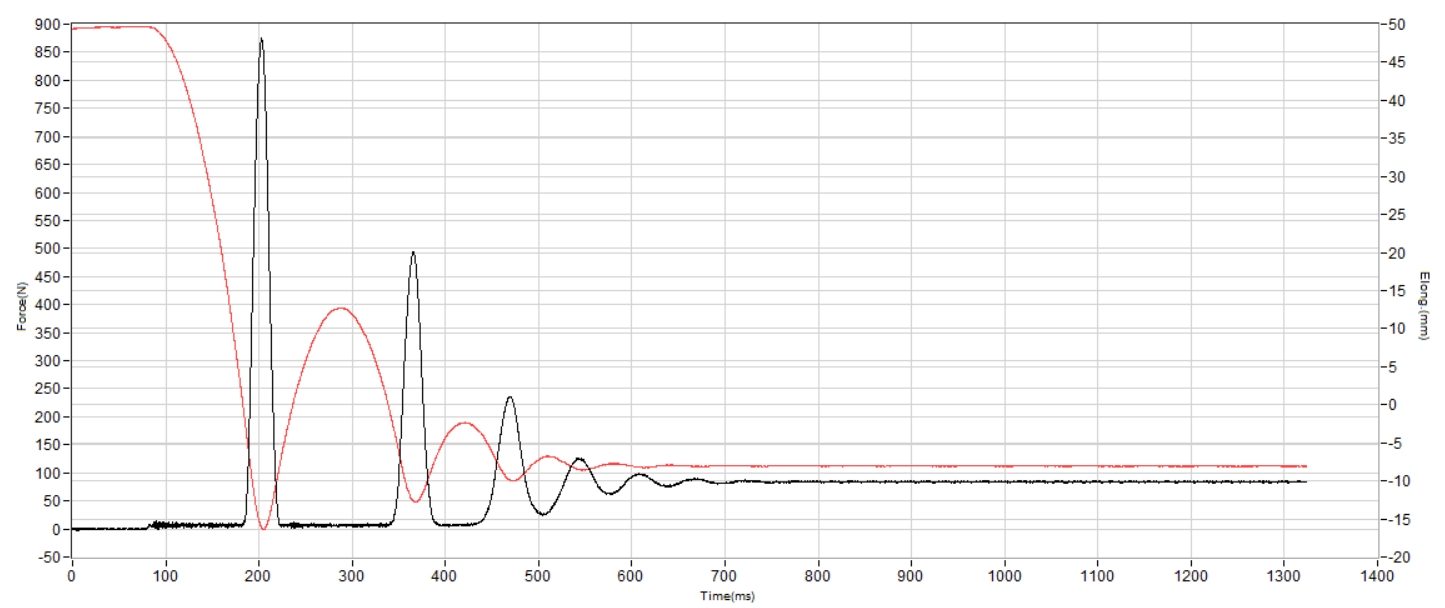
| Hoka Kaha 2 GTX | 114 SA |
| Average | 93 SA |
Energy return
Chunky and clunky, the Kaha wasn't meant to be responsive underfoot. Its minimal energy return of 38.5% implies a pretty flat and dull ride, but it's not a problem considering how planted, stable, and surefooted it makes you feel. Especially when there is a heavier backpack involved.
| Hoka Kaha 2 GTX | 38.5% |
| Average | 50.5% |
Heel stack
If it is from Hoka, it's got to be massive!
Using a caliper, we measured the boot's heel thickness at 39.3 mm which is notably taller than the average.
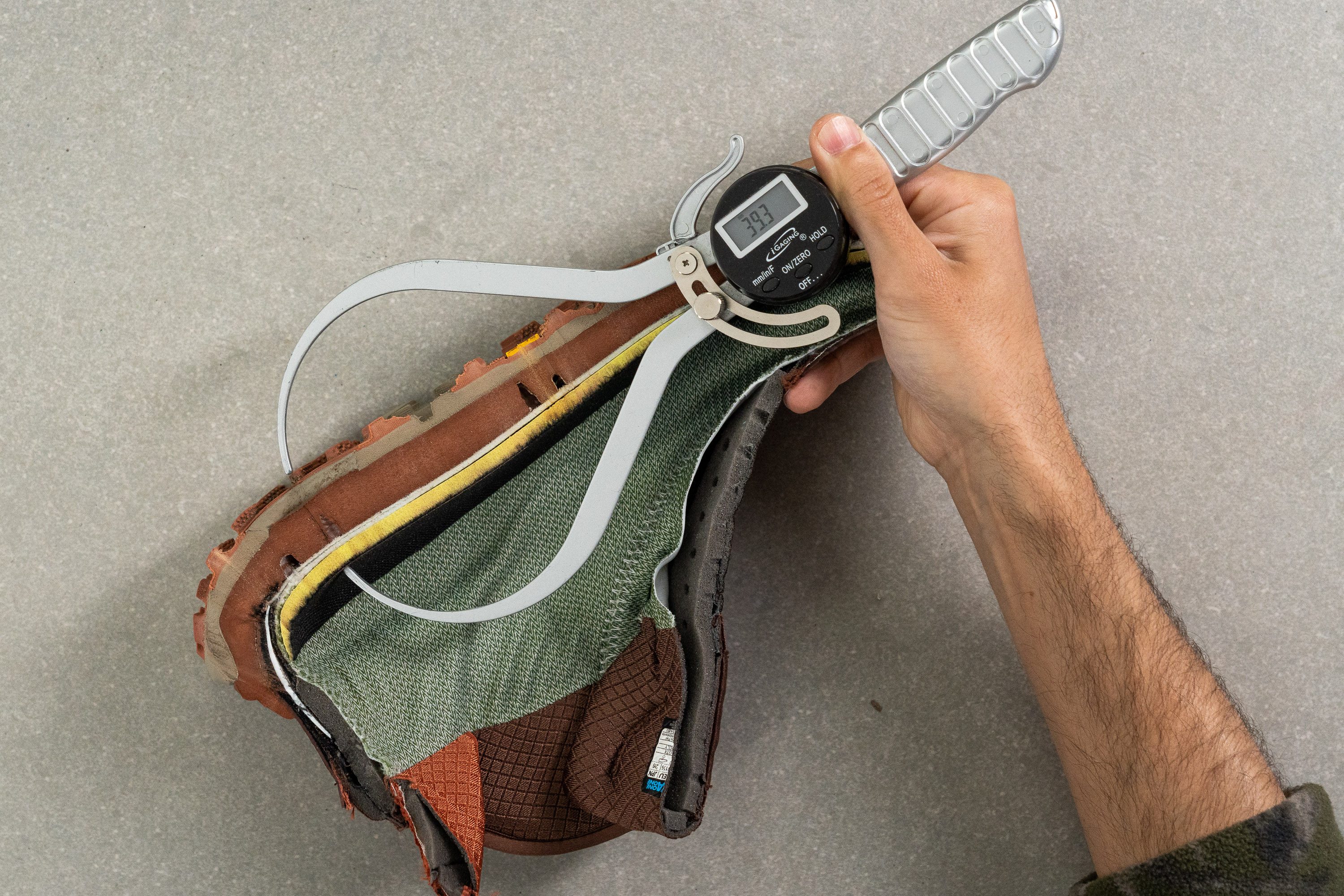
| Hoka Kaha 2 GTX | 39.3 mm |
| Average | 36.3 mm |
Forefoot stack
The Hoka Kaha 2 GTX is just as well-cushioned in the forefoot. Our caliper shows 28.2 mm of stack height which also turns out to be thicker than average.
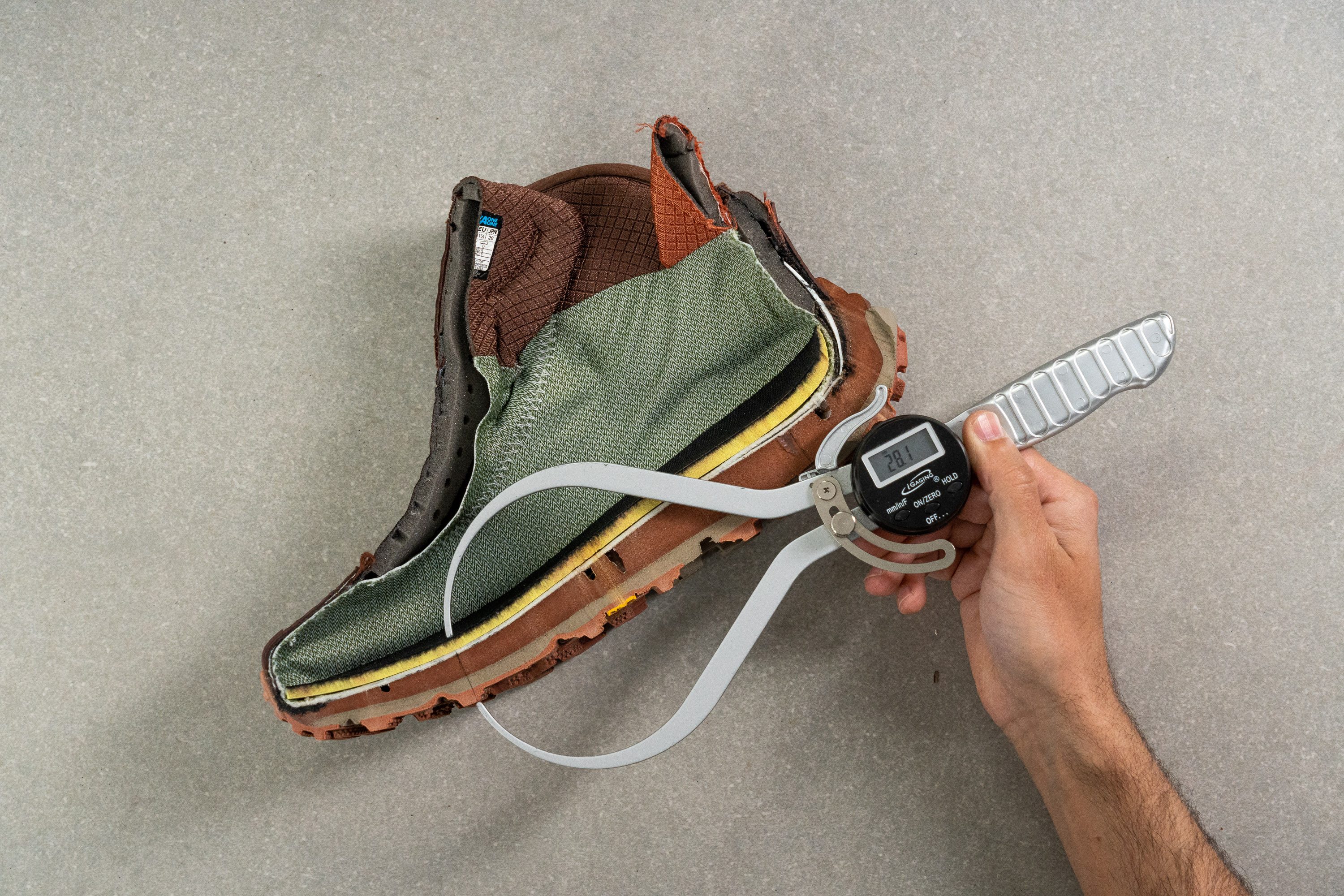
| Hoka Kaha 2 GTX | 28.1 mm |
| Average | 23.0 mm |
Drop
According to the official product page, the Kaha 2 GTX has a drop of 6 mm. But based on our own measurements, the heel-to-toe difference is actually as high as 11.2 mm!
That's a pretty big discrepancy and the heel does feel a bit elevated. However, given that the average drop ranges from 10 to 12 mm in hiking boots, we believe that the Kaha is going to feel comfortable for most hikers.
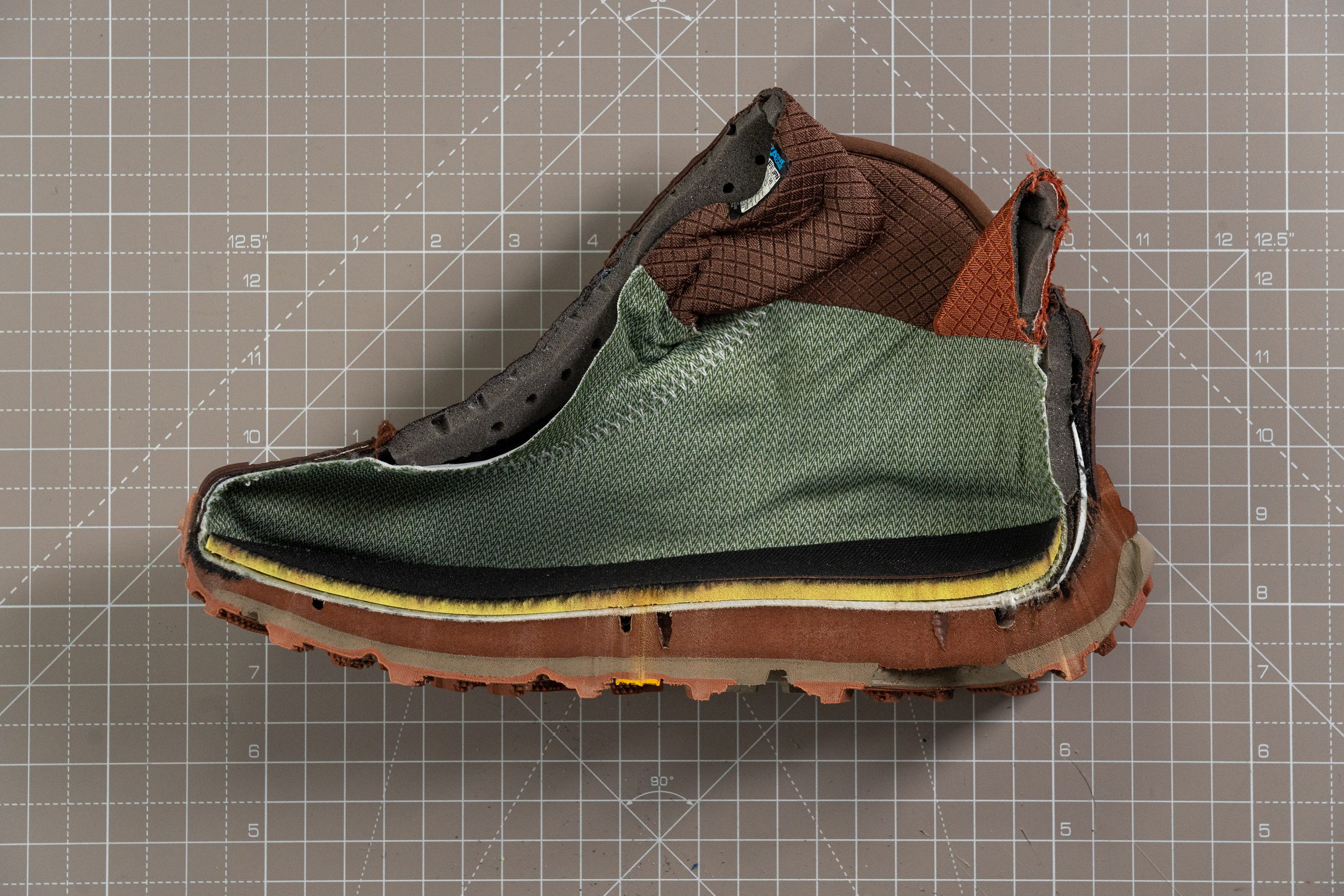
| Hoka Kaha 2 GTX | 11.2 mm |
| Average | 13.3 mm |
Midsole softness
On the foot, the Hoka Kaha 2 GTX doesn't feel as soft as some of the other Hoka offerings. Even though the brand categorizes it as "plush," we would describe the ride as balanced. We assume that it's because of the dual-density nature of the midsole which puts a firm carrier around the plush foam.
But the primary cushioning layer of the boot is indeed very soft. Pressing our durometer against it, we got a reading of 21.7 HA which is 29% softer than average.
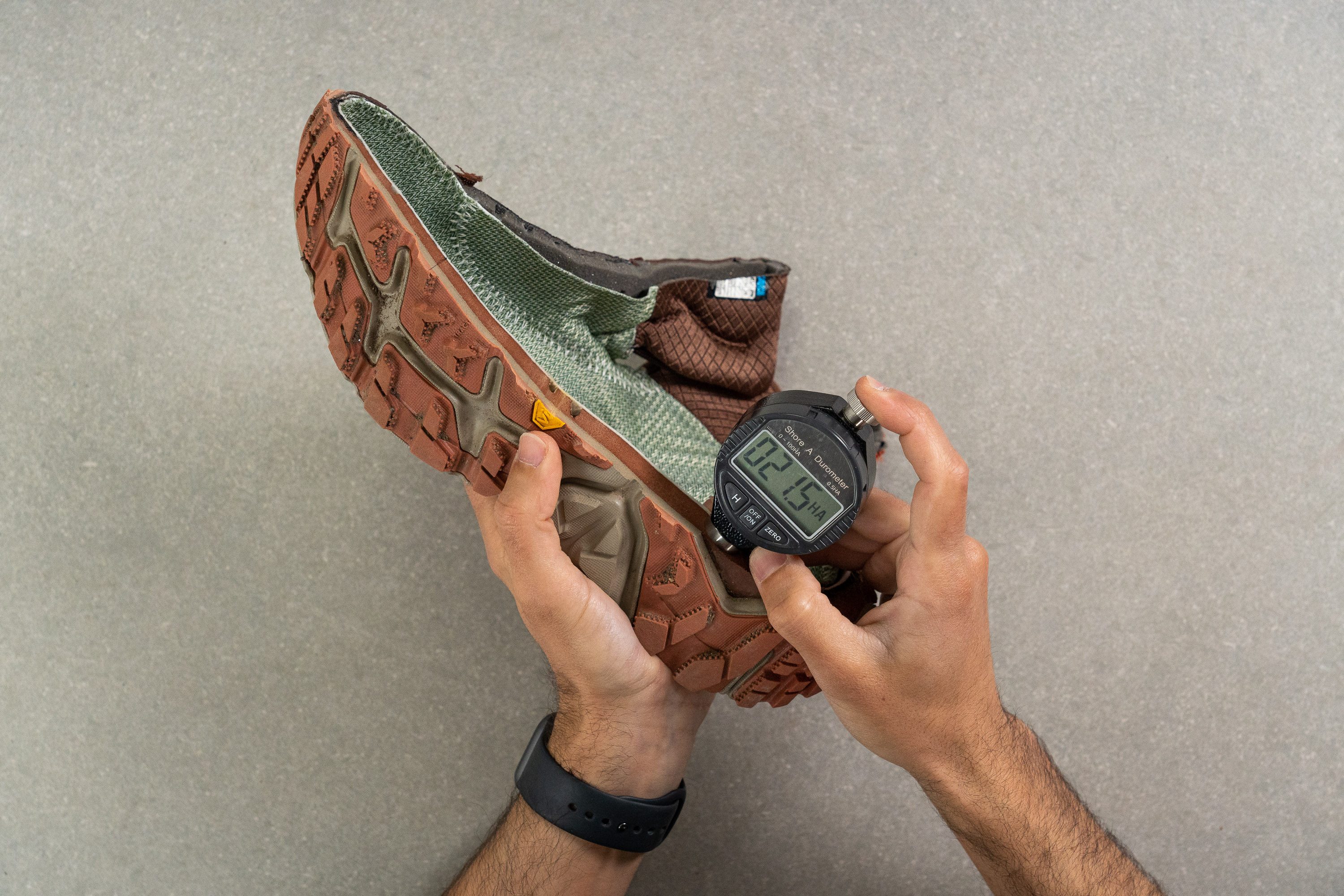
| Hoka Kaha 2 GTX | 21.7 HA |
| Average | 28.4 HA |
Secondary foam softness
To prevent the boot from being too squishy, it was put into a cradle of firmer foam. We measured its firmness at 31.6 HA which is 46% harder than the plush foam.
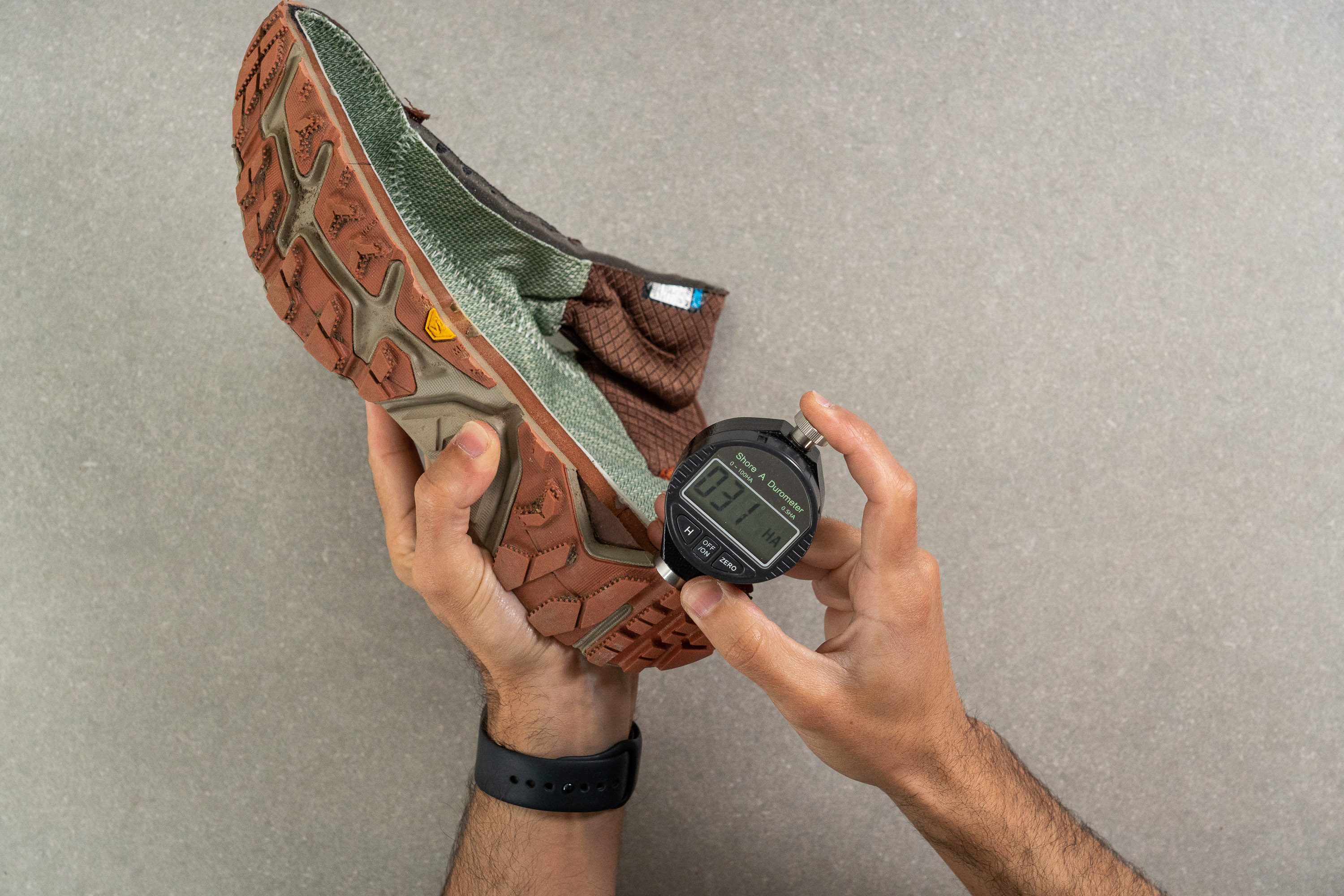
| Hoka Kaha 2 GTX | 31.6 HA |
| Average | 42.7 HA |
Size and fit
Size
Hoka Kaha 2 GTX fits true to size (84 votes).
Toebox width - widest part
This Hoka boot has a fairly accommodating fit for our average-sized feet.
We measured the widest part of its toebox at 97.3 mm which is a couple of millimeters narrower than average but is still within the solid medium range.
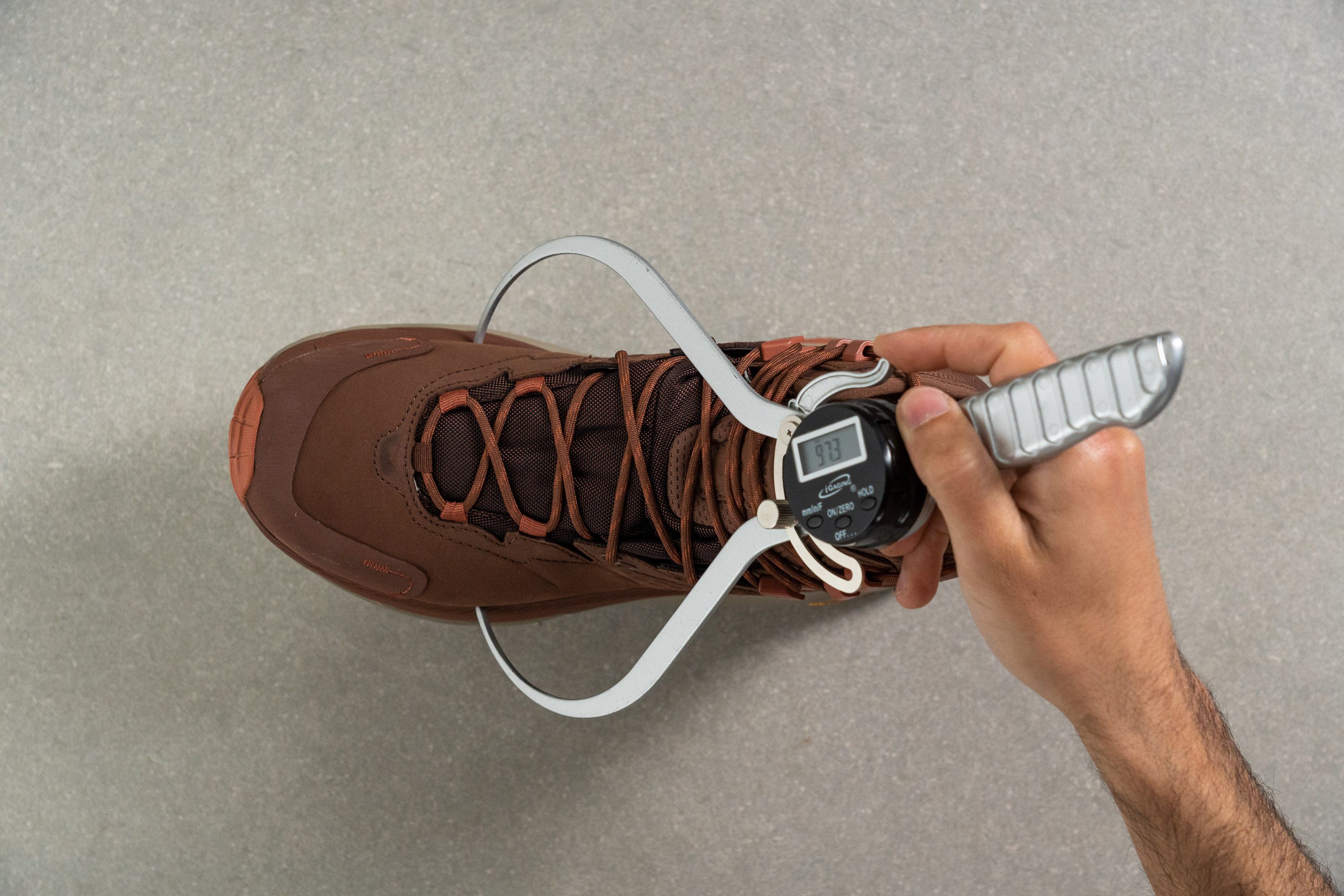
This test follows an older methodology, which is why you don't see recently tested shoes in the chart. Results from different methodologies can not be compared.
| Hoka Kaha 2 GTX | 97.3 mm |
| Average | 102.1 mm |
Toebox width - big toe
But when it comes to the tip of the toe, the boot turns out to be pretty spacious.
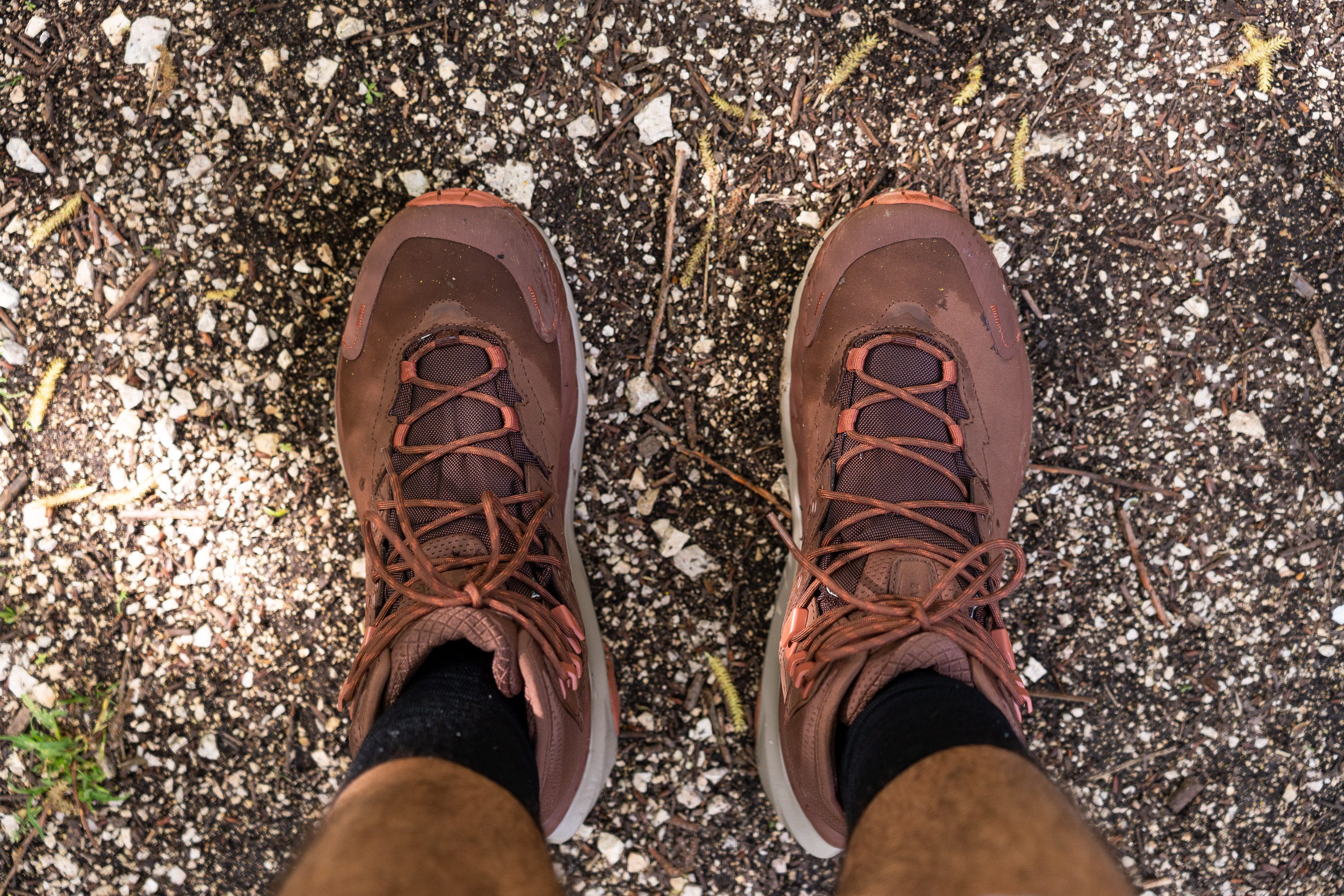
Based on our caliper, it is 79.8 mm wide which is about 4 mm wider than average. That means plenty of space for swollen feet.
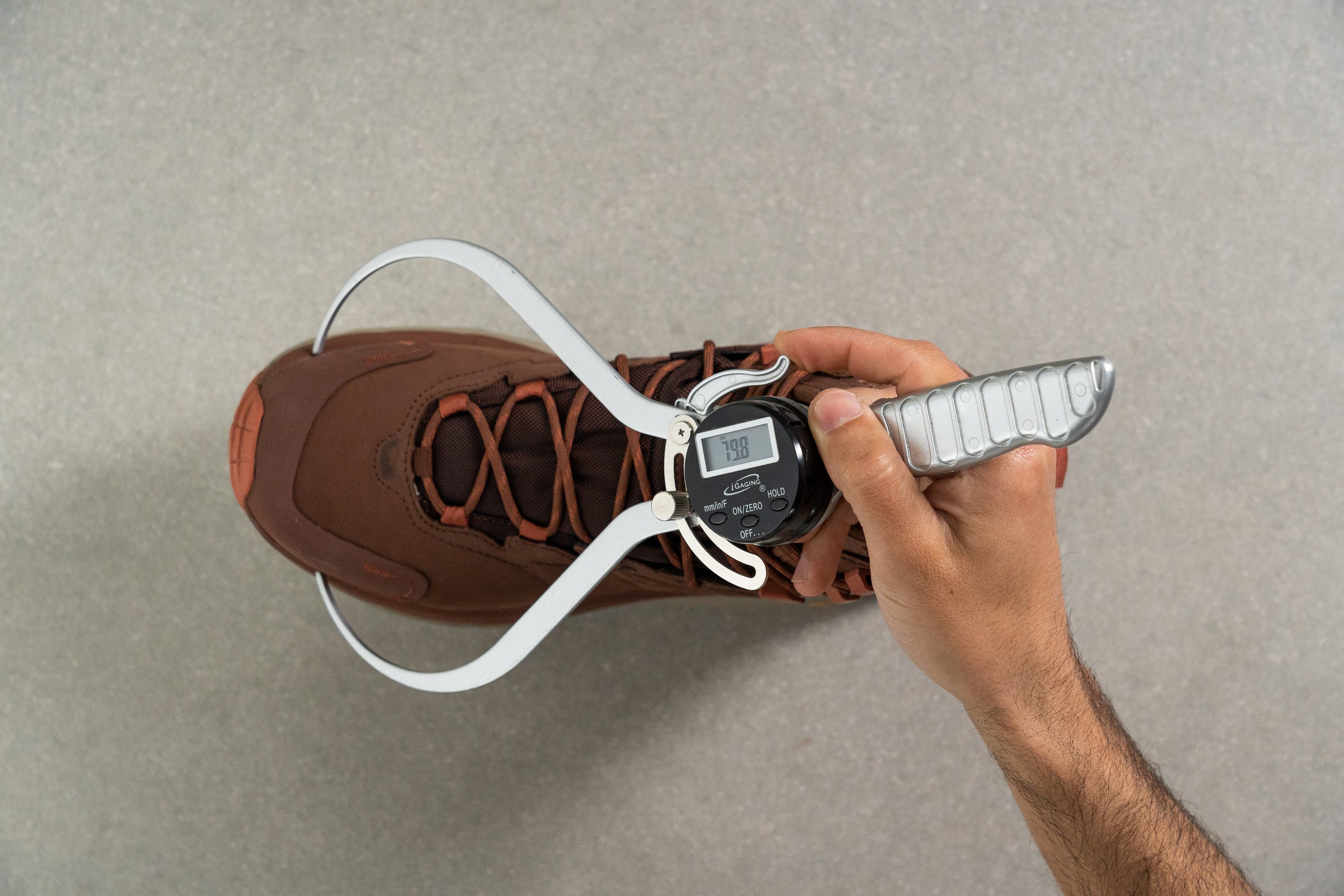
This test follows an older methodology, which is why you don't see recently tested shoes in the chart. Results from different methodologies can not be compared.
| Hoka Kaha 2 GTX | 79.8 mm |
| Average | 78.6 mm |
Traction / Grip
Lug depth
As a waterproof boot, the Hoka Kaha 2 GTX knows that you will be getting into slippery situations. That's why it is equipped with some pretty deep lugs that worked amazingly on soft and wet ground as well as on wet rocks.
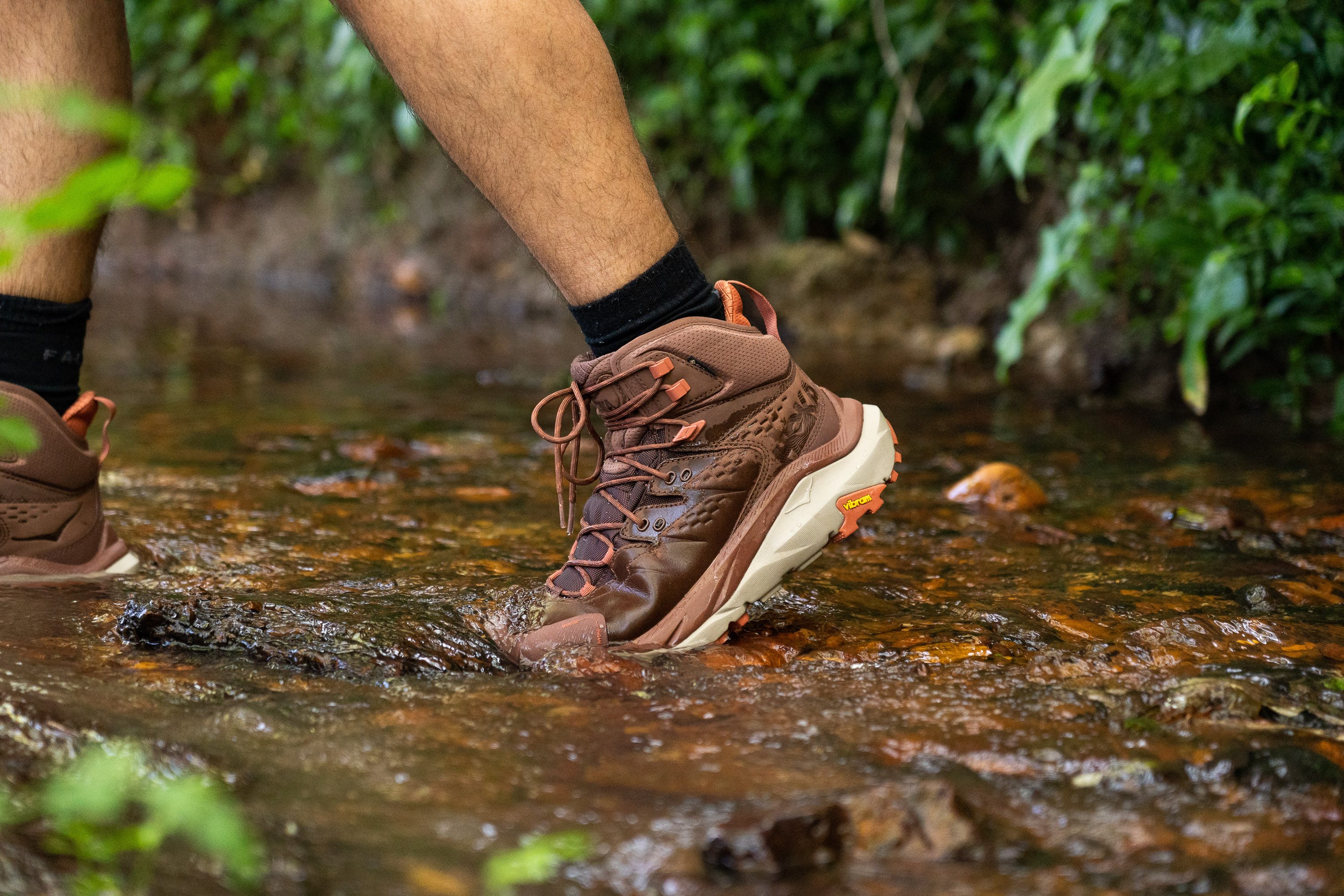
Measuring the lugs, we found that they are 4.9 mm deep. A little toothier than average!
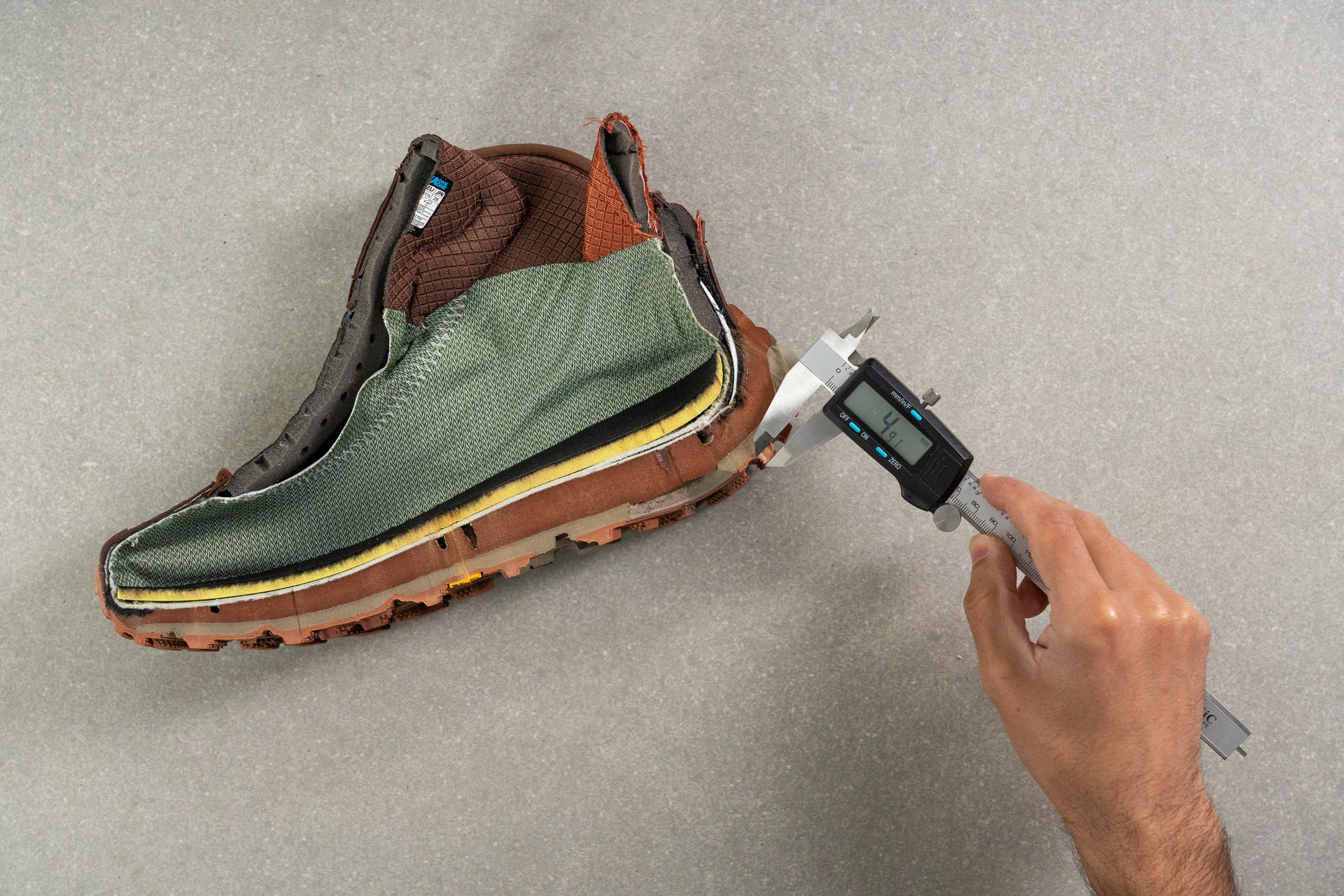
| Hoka Kaha 2 GTX | 4.9 mm |
| Average | 4.3 mm |
Flexibility / Stiffness
The Hoka Kaha 2 GTX is just as stiff as the rest of our lab-tested boots.
It took a good deal of force to bend the boot to a 30-degree angle. Based on our shoe flexing tester, it required 35.1N, which is even a little more than the average. It also tells us that the Kaha 2 GTX is a bit stiffer than the original Anacapa Mid GTX.
In combination with a rockered sole, it felt like we were propelled to the next step by this Hoka boot.
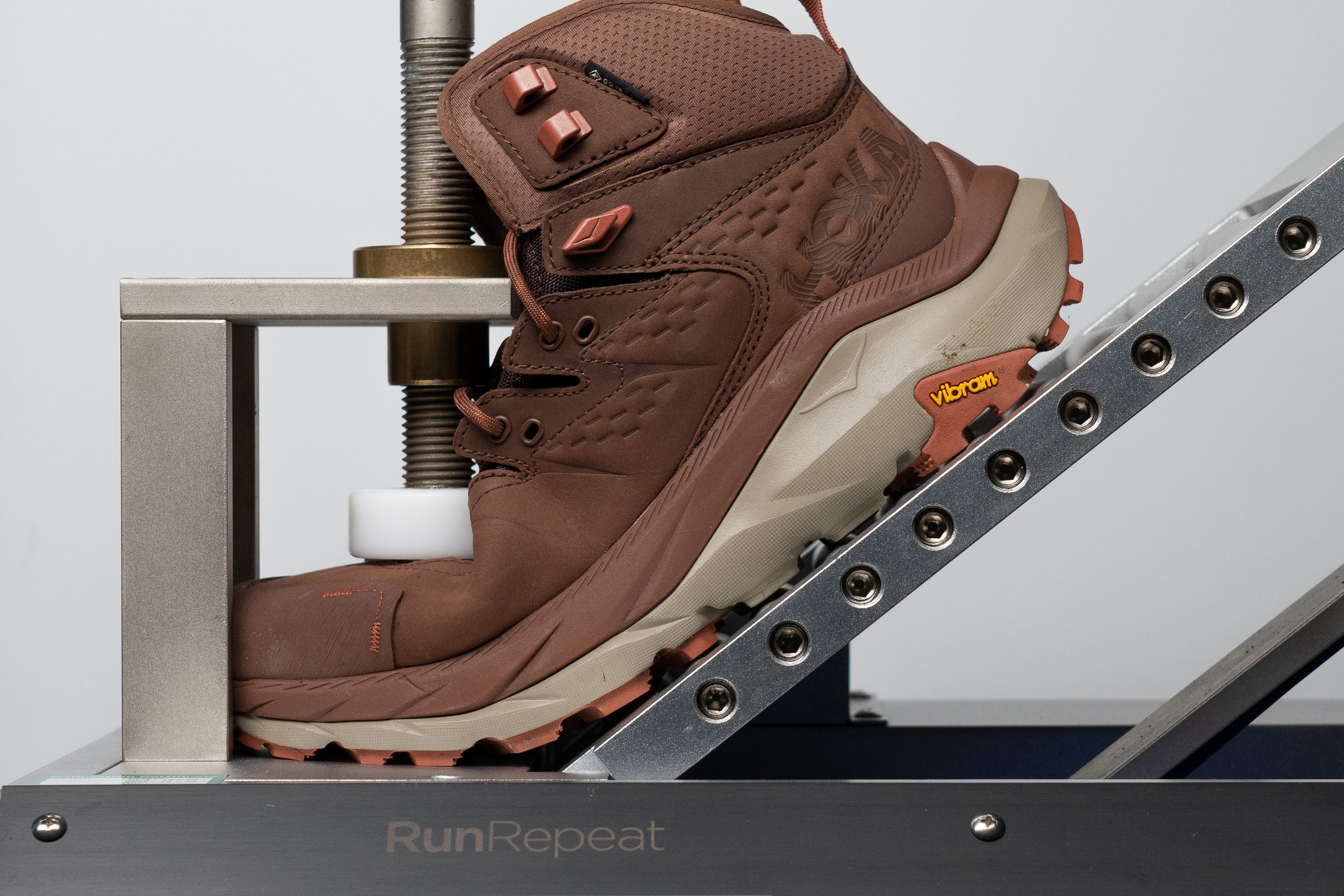
| Hoka Kaha 2 GTX | 35.1N |
| Average | 31.5N |
Weight
For a backpacking-ready boot, the Hoka Kaha 2 GTX doesn't feel heavy at all.
Putting it on a scale, we saw 18.5 oz (525g) in a men's US size 9. This is significantly lighter than the backpacking boots on average (23.3 oz/660g)!
We applaud Hoka for packing so much cushioning, support, and high-quality materials into a relatively light boot.
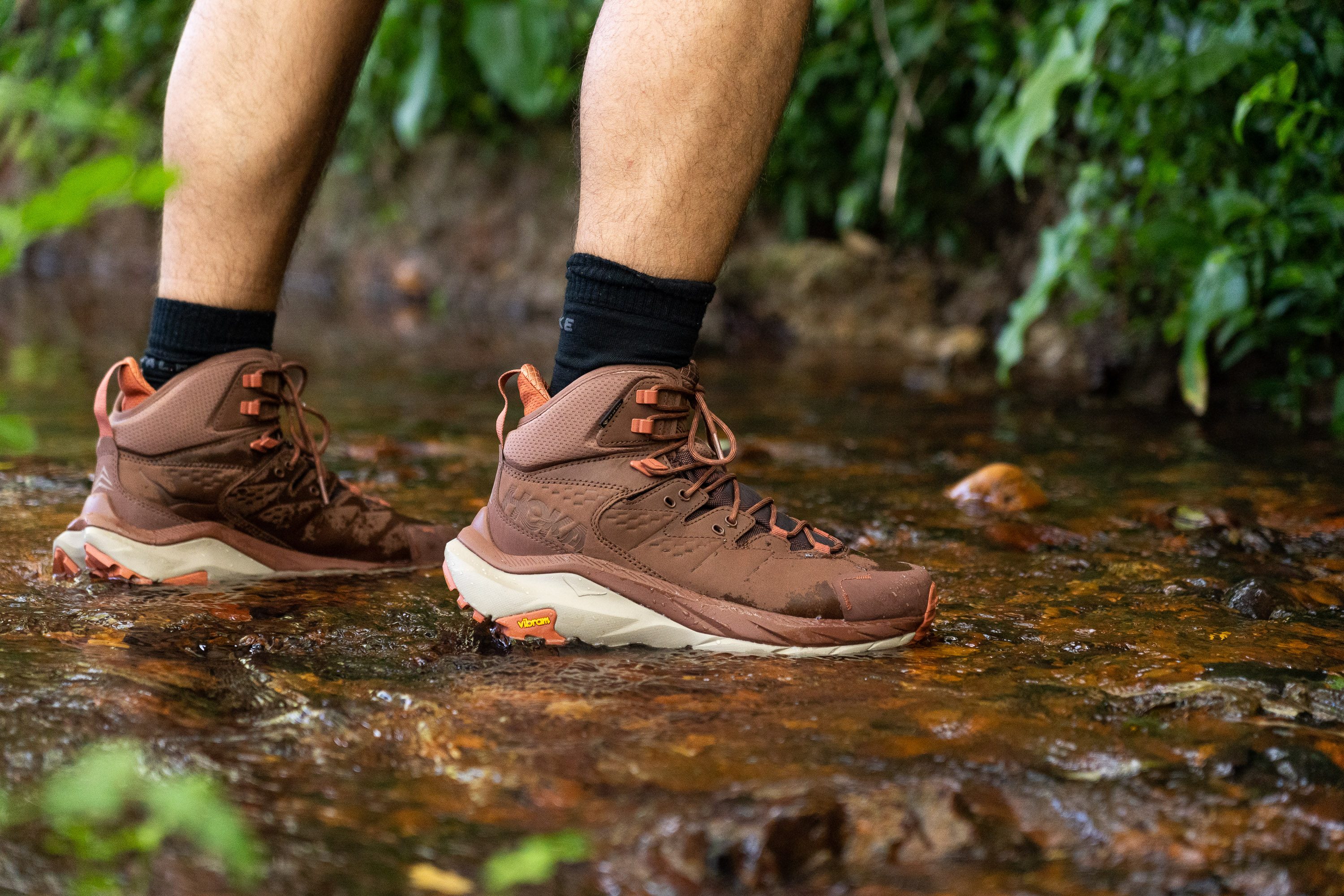
| Hoka Kaha 2 GTX | 18.5 oz (525g) |
| Average | 18.7 oz (531g) |
Breathability
Based on both our field and lab tests, the Hoka Kaha 2 GTX is a 100% water-tight boot!
Pumping smoke through the boot's upper, it didn't come out anywhere except the topmost eyelet. So, on a scale from 1 to 5 where 5 is the most breathable, we rated the boot's breathability as 1.
This is all thanks to the use of a GORE-TEX membrane in addition to the sturdy nubuck leather upper and water-repellent coating. Here is what the tongue fabric looks like under our microscope.
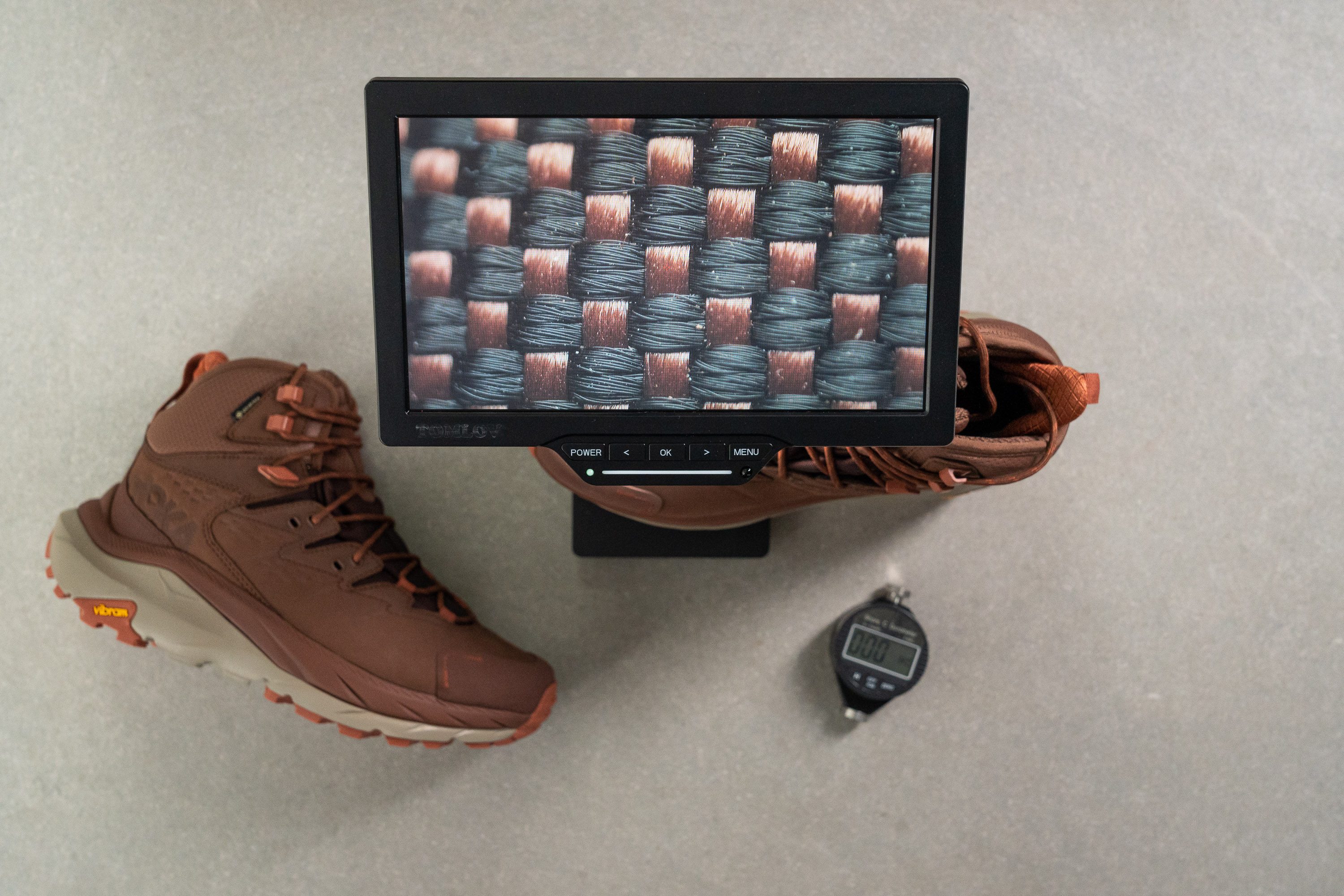
The water has no chance of seeping through.
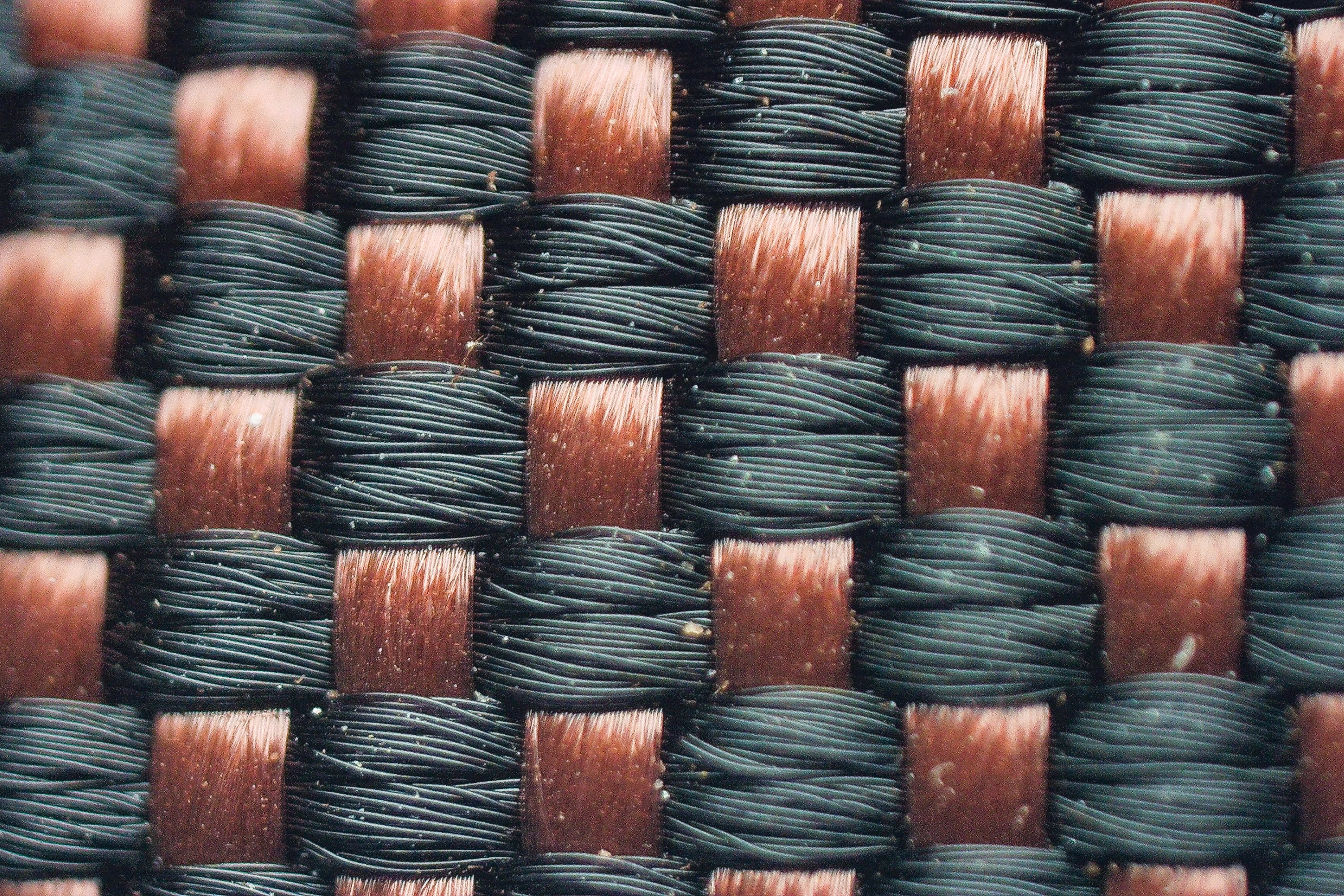
With so much waterproofing going on, our feet came out dry after every single creek crossing in the Kaha 2 GTX.
| Hoka Kaha 2 GTX | 1 |
| Average | 1.3 |
Stability
Lateral stability test
From our hiking experience, the Hoka Kaha 2 GTX proved to be a very supportive companion for multi-day hikes with backpacks up to 40 pounds.
There was no ankle rolling or nasty wobbling along the way. The platform felt very stable while the collar did an amazing job keeping the ankle in place.
Torsional rigidity
As one of the key stability components, torsional rigidity can tell a lot about the boot. As you can see from our manual test below, it is nearly impossible to get that twist from the boot with bare hands. We rated the Kaha 2 GTX with a maximum score of 5/5 for stiffness.
The boot has a very sturdy and structured build.
| Hoka Kaha 2 GTX | 5 |
| Average | 4.4 |
Heel counter stiffness
The heel collar has a peculiar design in the Hoka Kaha 2 GTX. Trimmed down at the back, it is also not as rigid as in many other hiking boots. We actually rated its heel counter stiffness as only 2 out of 5.
Interestingly enough, this approach to heel hold didn't compromise ankle support and even helped to shave a few ounces off the boot.
| Hoka Kaha 2 GTX | 2 |
| Average | 3.6 |
Midsole width - forefoot
This Hoka boot has a footprint of a beast!
In the widest part of the forefoot, we measured the sole at 117 mm, which is a few millimeters wider than average. This broad base made us feel very planted and surefooted in a variety of scenarios.
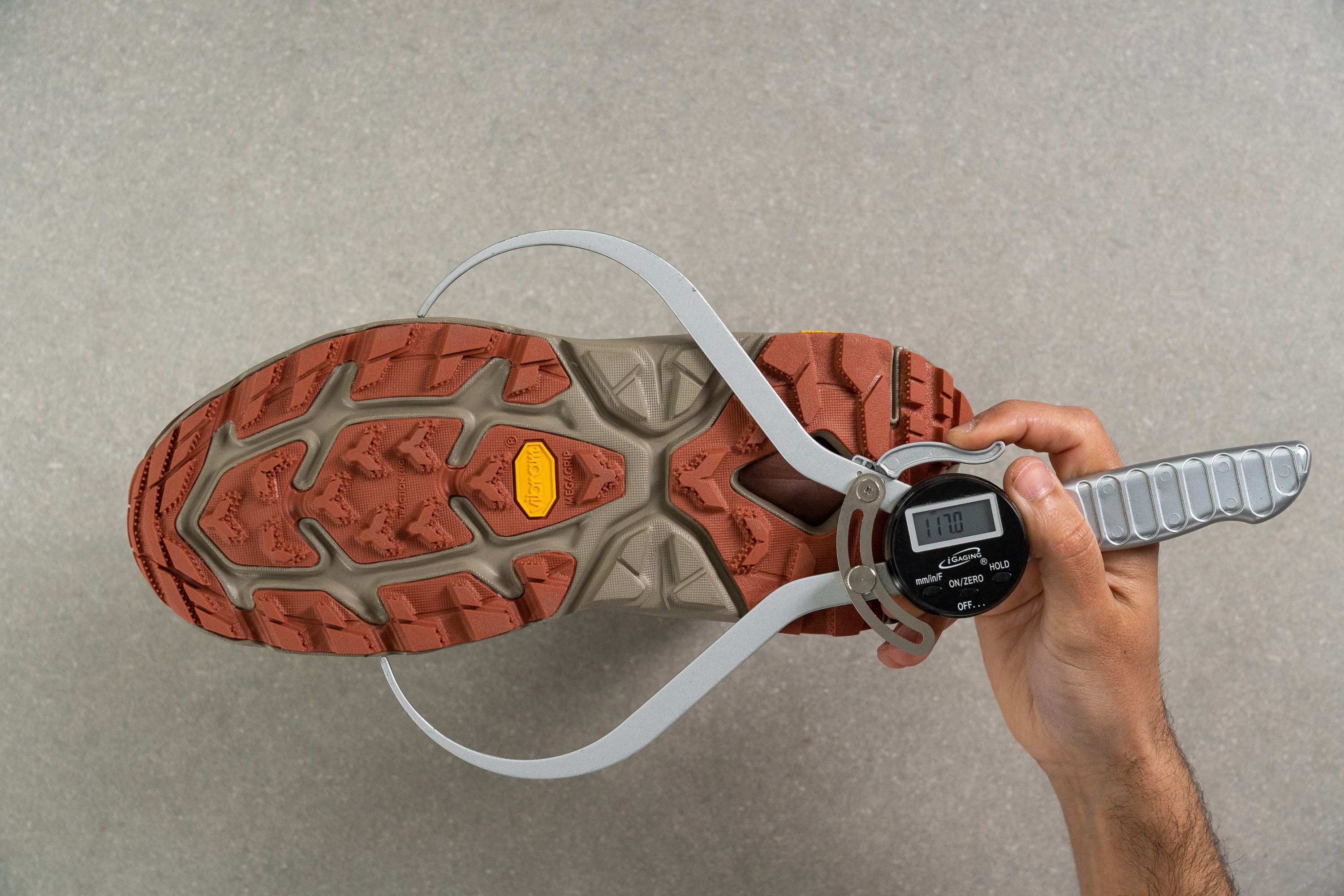
| Hoka Kaha 2 GTX | 117.0 mm |
| Average | 111.5 mm |
Midsole width - heel
But the boot's heel is where things start to get crazy. Our caliper shows a whopping 106.1 mm in the widest part of the heel! This is almost a centimeter wider than average!
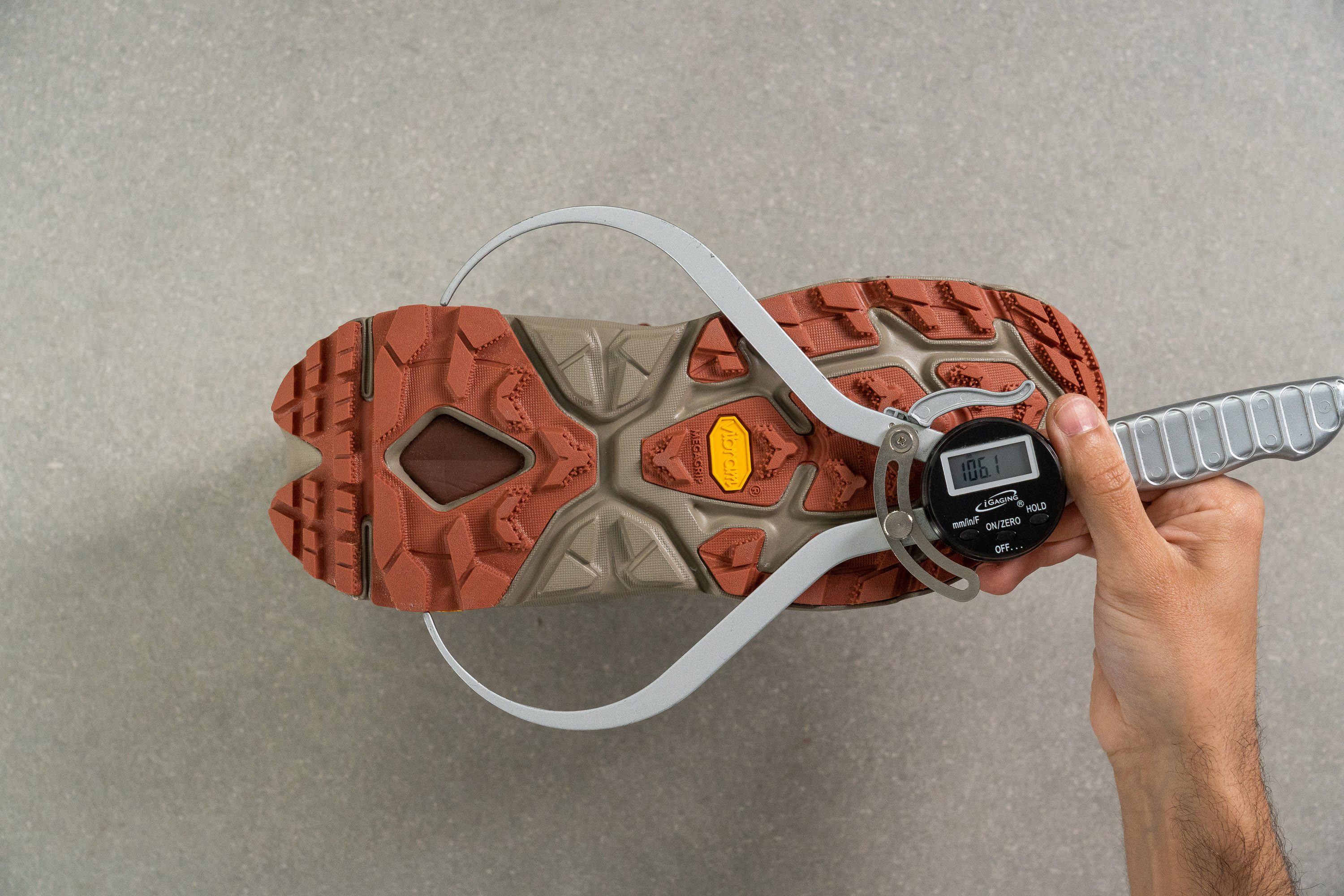
In addition to that, the Kaha 2 GTX also has a pretty voluminous sole design at the back. While it works wonders on long hikes and when descending, it turned out to be a nuisance on the more technical stretches of our route.
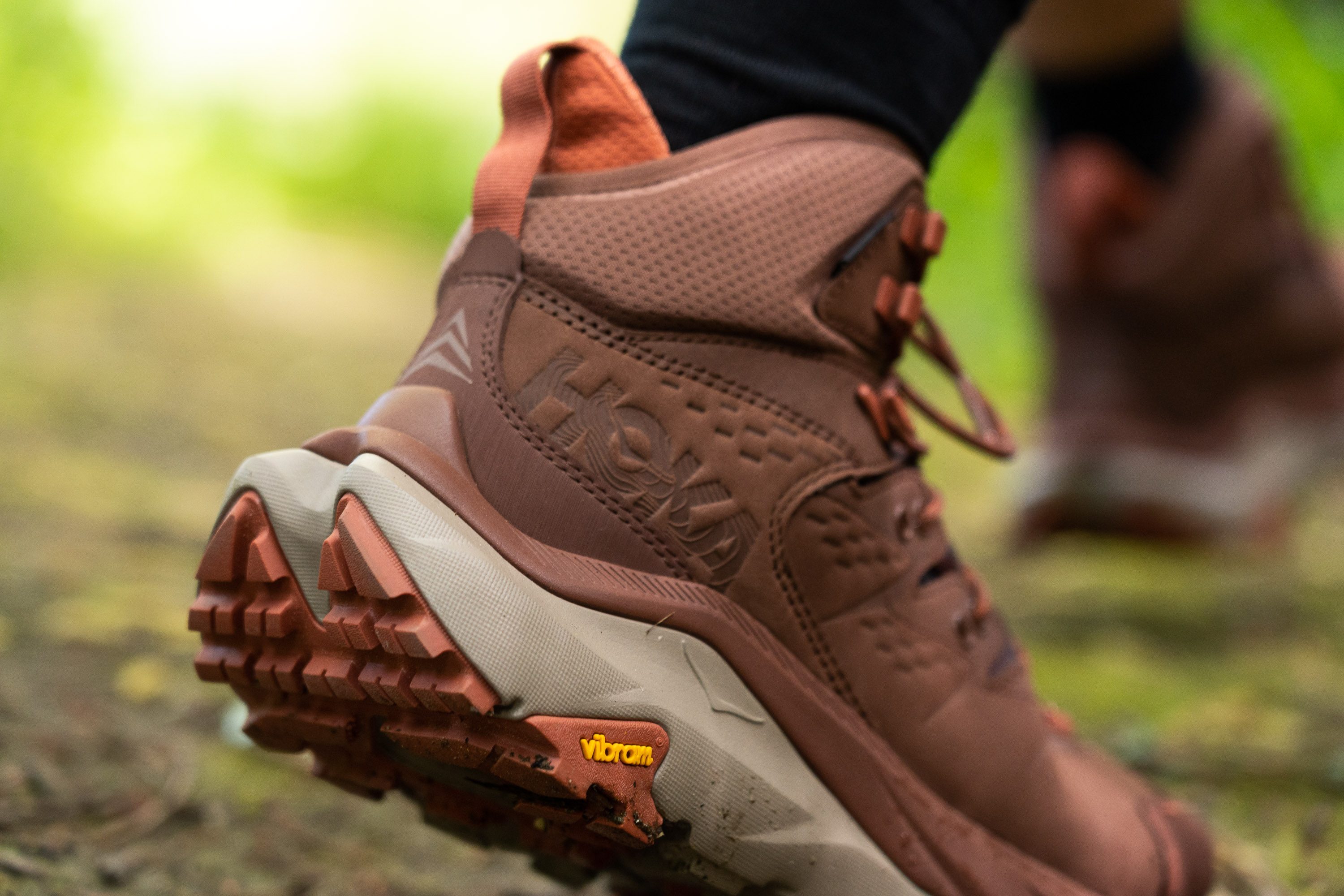
On rocky terrain, we ended up catching nearly every stone with this extended heel! This was a real nuisance as it made us feel like a clumsy behemoth. Maneuverability is definitely not to be expected from this Hoka.
| Hoka Kaha 2 GTX | 106.1 mm |
| Average | 87.6 mm |
Durability
Toebox durability
As the brand's top-of-the-list hiking boot, the Hoka Kaha 2 GTX shows phenomenal durability.
Coming from a certified gold-rated tannery, its leather was barely scratched in our Dremel test. Where most boots end up with a see-through hole, the damage was barely even noticeable on the Kaha (on the left).
The boot gets a well-deserved 5 out of 5 in our toebox durability test.
| Hoka Kaha 2 GTX | 5 |
| Average | 4.3 |
Heel padding durability
Even such a sensitive area as the heel collar padding resisted our Dremel admirably. You can tell by the shifting of the tool that the material was fighting it back!
Another perfect score of 5/5 goes out to the Kaha 2 GTX!
| Hoka Kaha 2 GTX | 5 |
| Average | 3.6 |
Outsole hardness
Hoka also went for a highly wear-resistant Vibram rubber to create a durable outsole.
We measured its hardness at 88.4 HC which is a little firmer than average and thus, more hard-wearing.
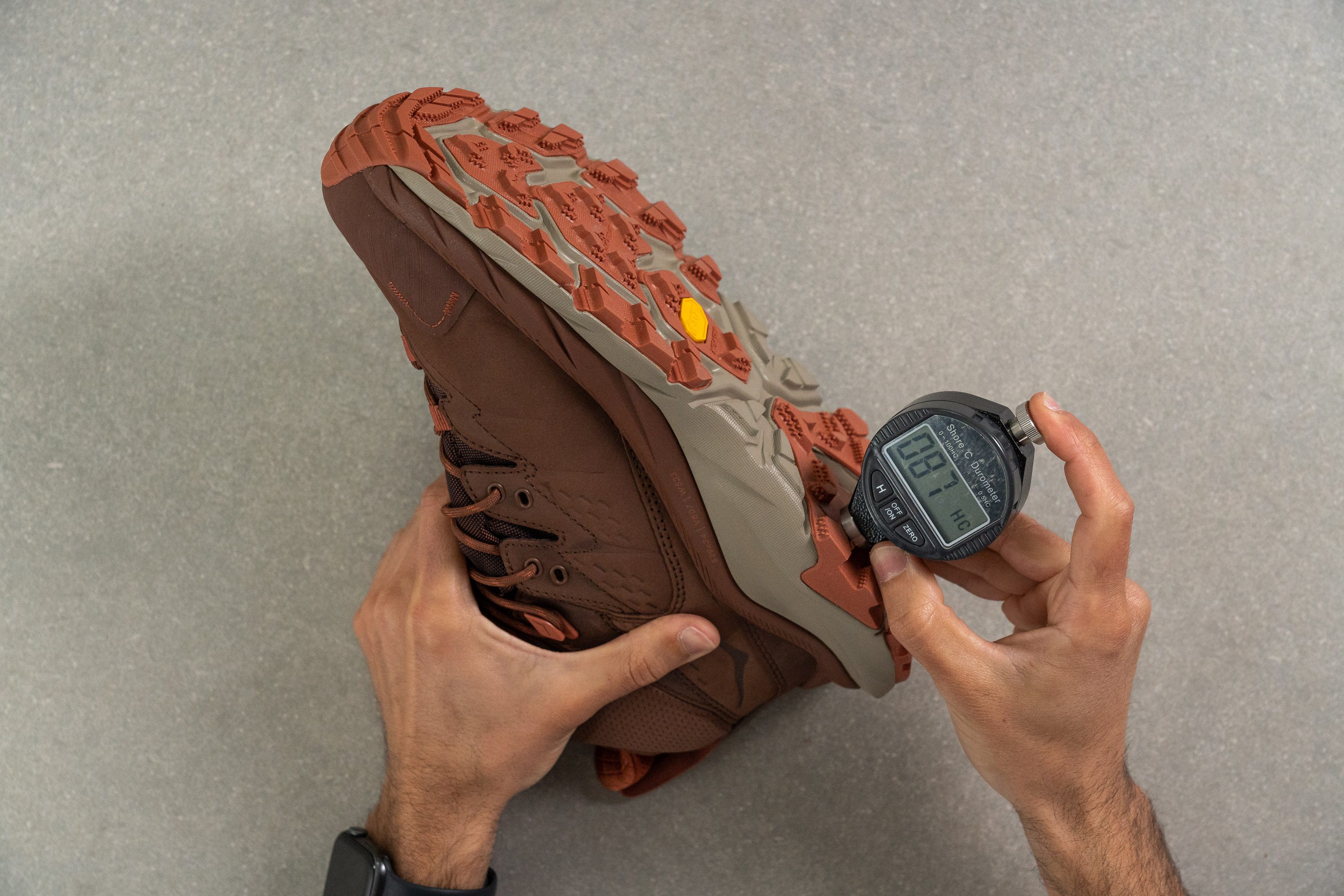
| Hoka Kaha 2 GTX | 88.4 HC |
| Average | 87.1 HC |
Outsole thickness
Measuring the rubber thickness excluding the lug depth, we got 2 mm. This is thinner than the average but is very well compensated for by a thick layer of firm foam.
It's going to take more than one season of hiking to destroy this boot.
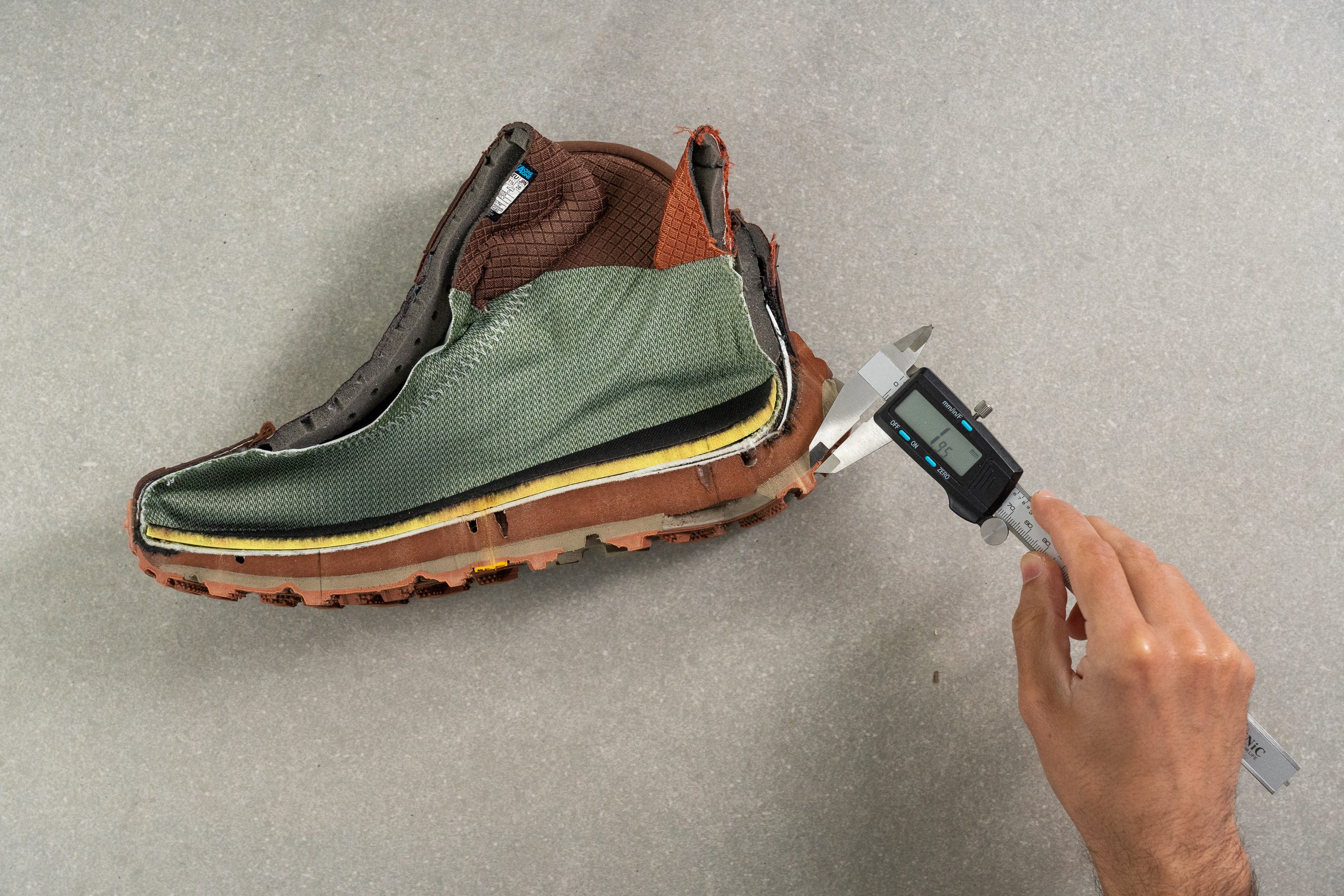
| Hoka Kaha 2 GTX | 2.0 mm |
| Average | 2.9 mm |
Misc
Insole thickness
Complementing the main cushioning is a well-padded insole. Based on our caliper measurement, it is 6.4 mm thick which is about the same as the average.
It offered a pleasant step-in feel from the beginning and later helped our tired feet push forward.
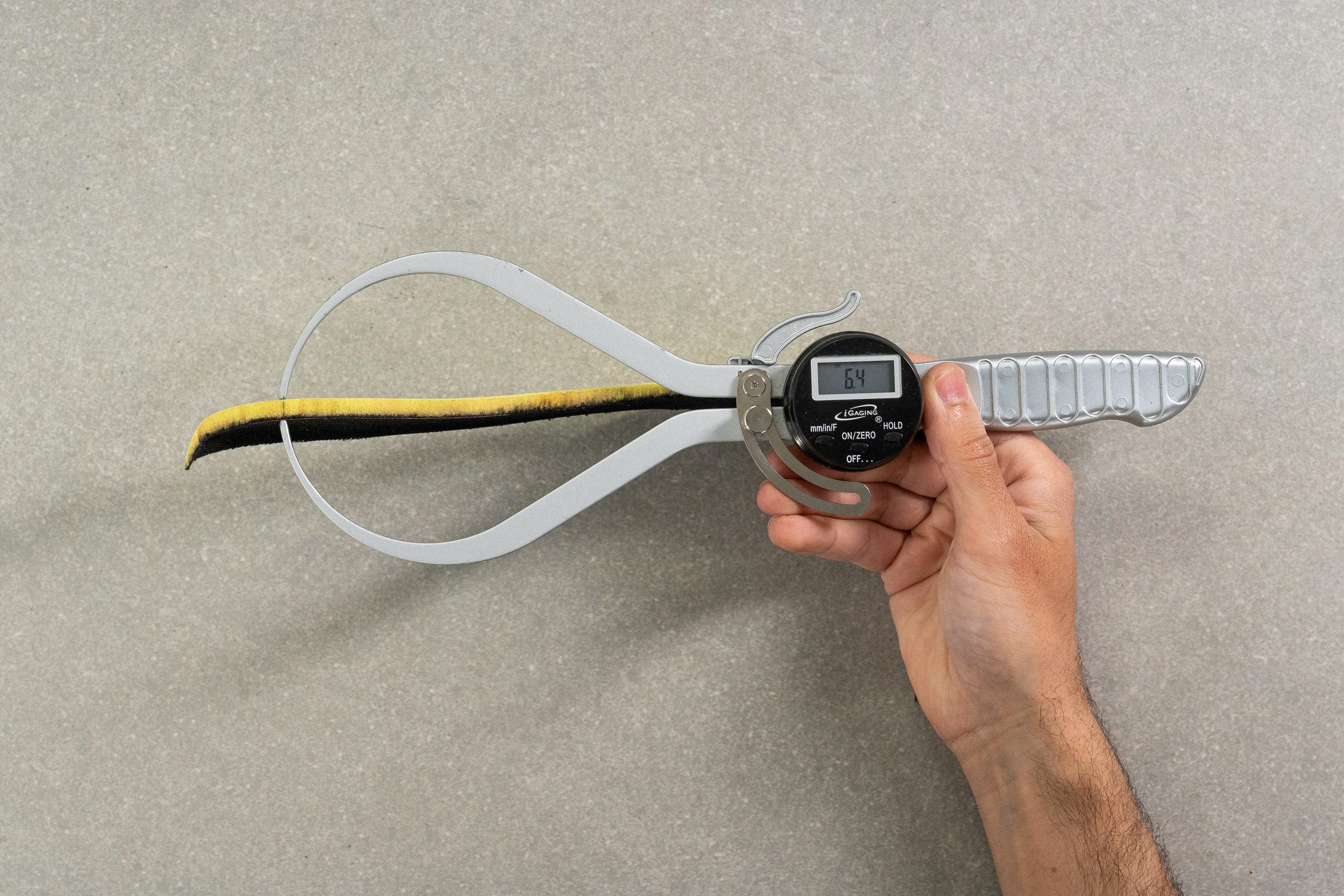
| Hoka Kaha 2 GTX | 6.4 mm |
| Average | 6.0 mm |
Removable insole
The boot's insole is removable and welcomes custom orthotics easily.
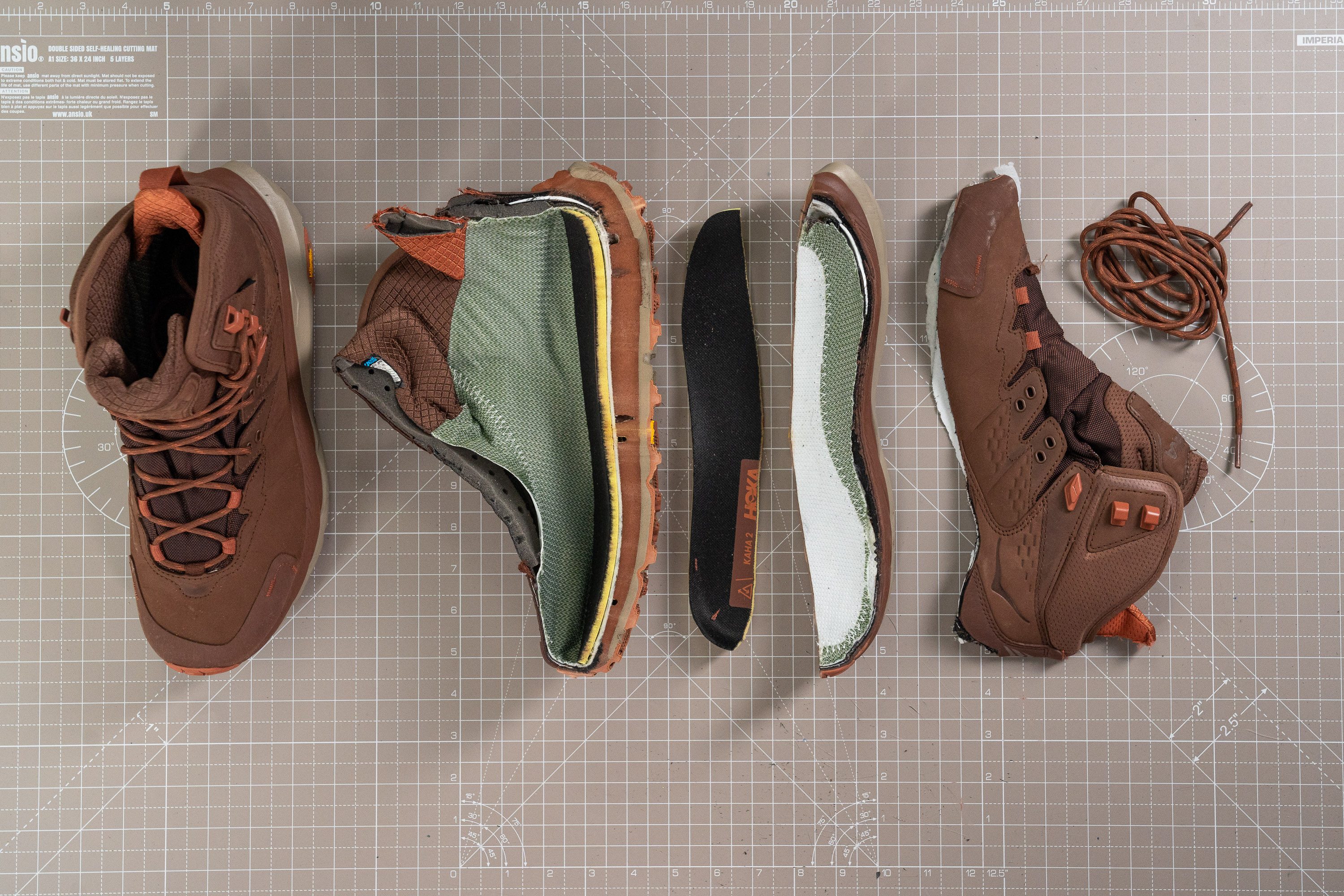
| Hoka Kaha 2 GTX | Yes |
Midsole softness in cold (%)
The most amazing fact about this boot's cushioning is that it barely firms up in low temperatures! To mimic cold weather, we put the Kaha 2 GTX into a freezer for 20 minutes. After that, we repeated the durometer measurement and got 27.3 HA which is a mere 25.6% firmer than it was at room temperature.
For reference, other hiking boot foams firmed up to 33.9 HA after the same test.
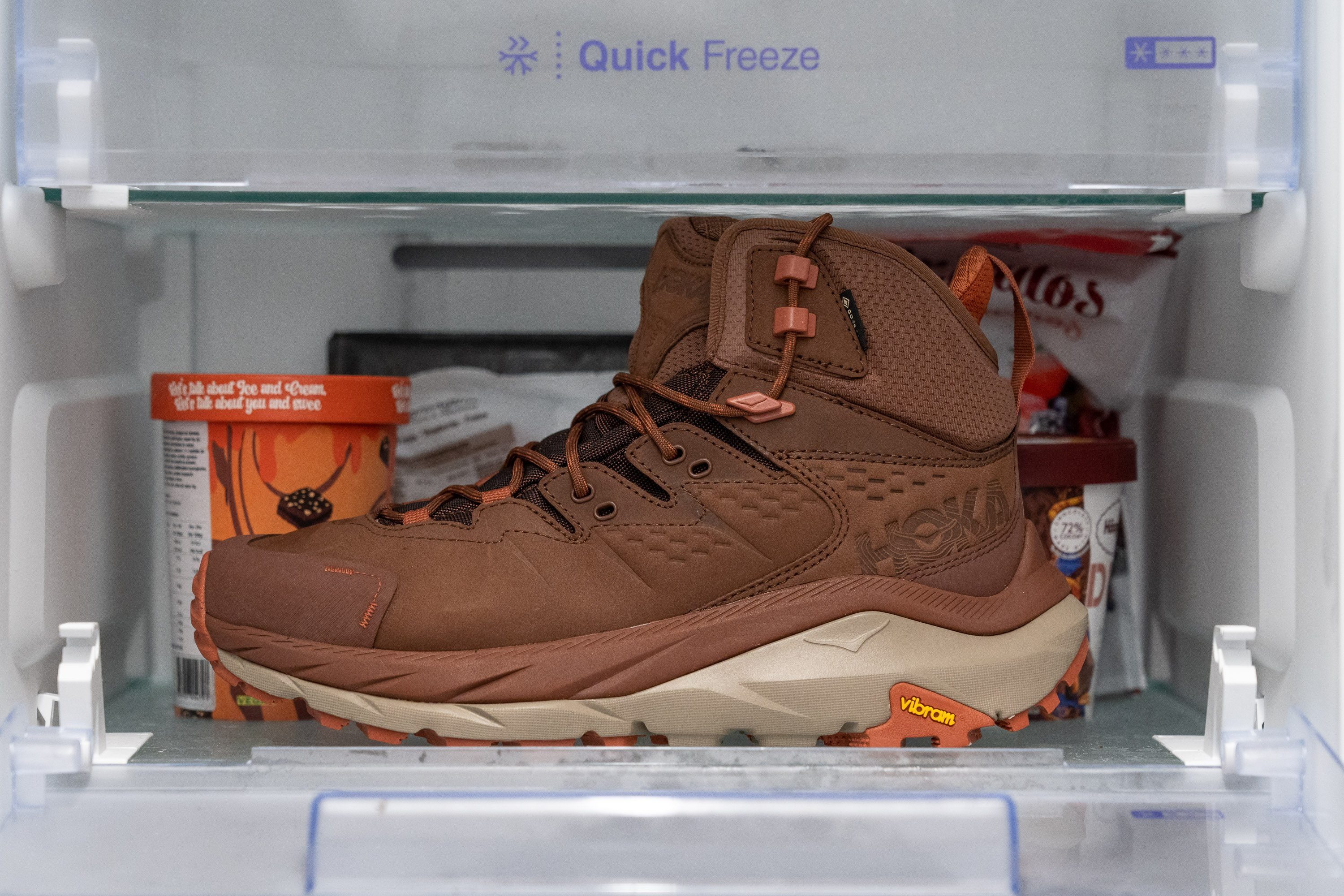
| Hoka Kaha 2 GTX | 26% |
| Average | 20% |
Tongue padding
We have both good and bad news about the tongue.
The good news is that it is super well-padded, having as much as 12.5 mm of thickness based on our measurements.
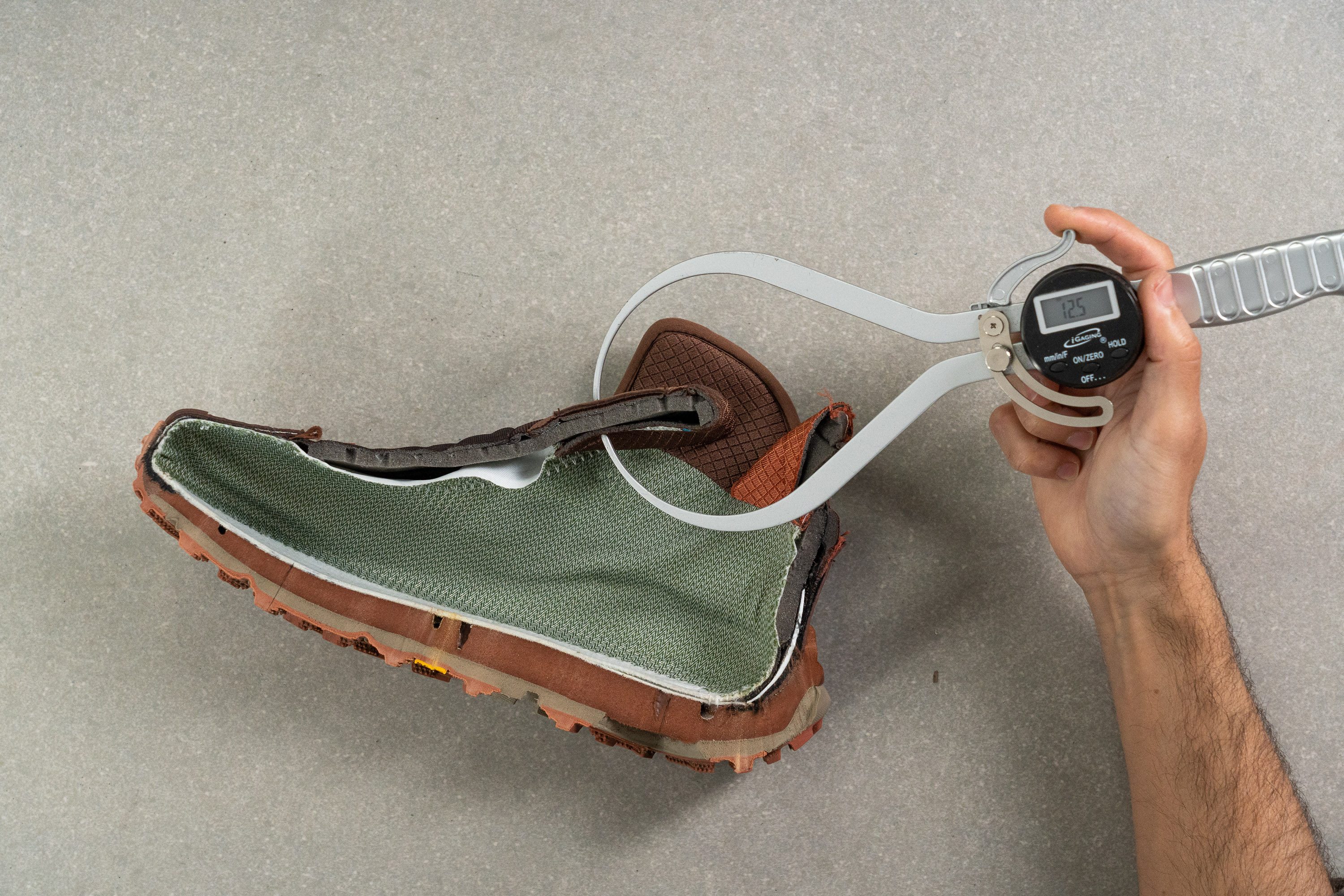
But the deal-breaking problem with it is that it is way too short. When we laced up the boot fully, the knot appeared to be at the very edge of the collar. Given that the padding is not very abundant there, it resulted in a good deal of pressure on the shin. And when we tried to loosen up the knot, it compromised the ankle hold.
A pair of thicker socks can do the trick but we just didn't expect a "fixer-upper" for $240.
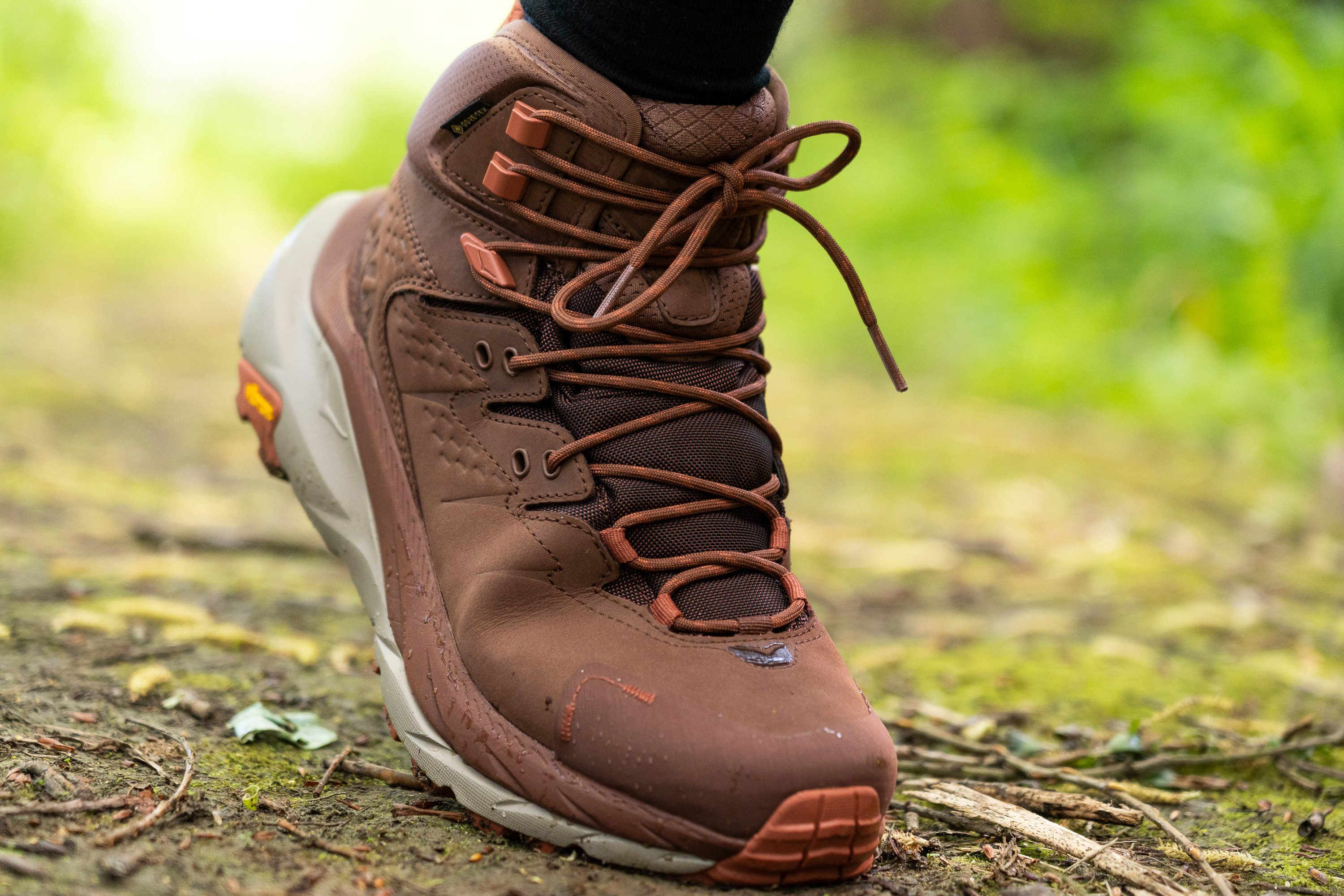
| Hoka Kaha 2 GTX | 12.5 mm |
| Average | 11.2 mm |
Tongue: gusset type
The boot is fully guarded against water and debris with its fully-gusseted tongue. Not only is it crucial for keeping those at bay but it also creates a highly secure foot containment.
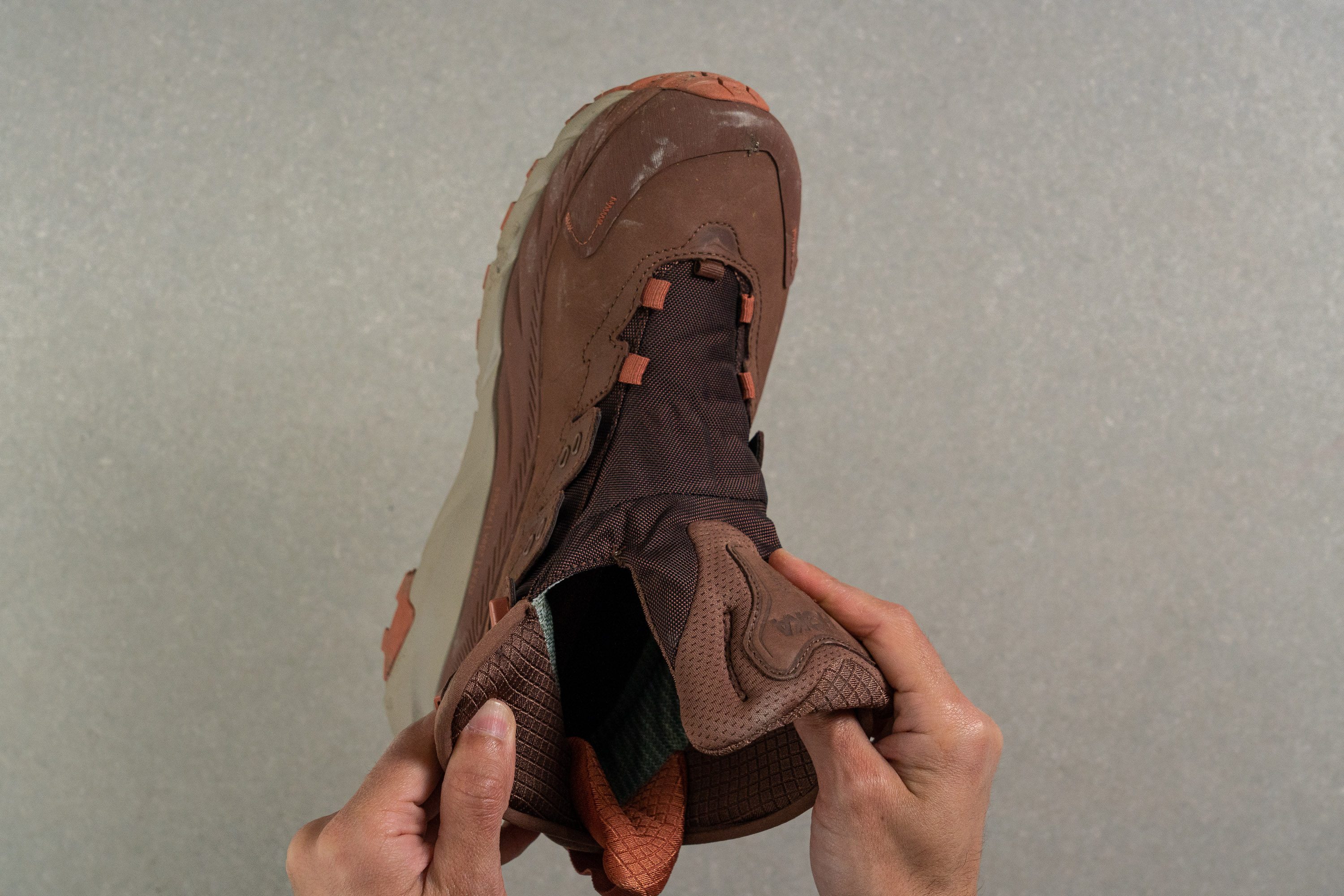
| Hoka Kaha 2 GTX | Both sides (full) |
Heel tab
With the boot's intricate collar design, we were glad that Hoka attached a finger loop at the back for easier on-and-off.
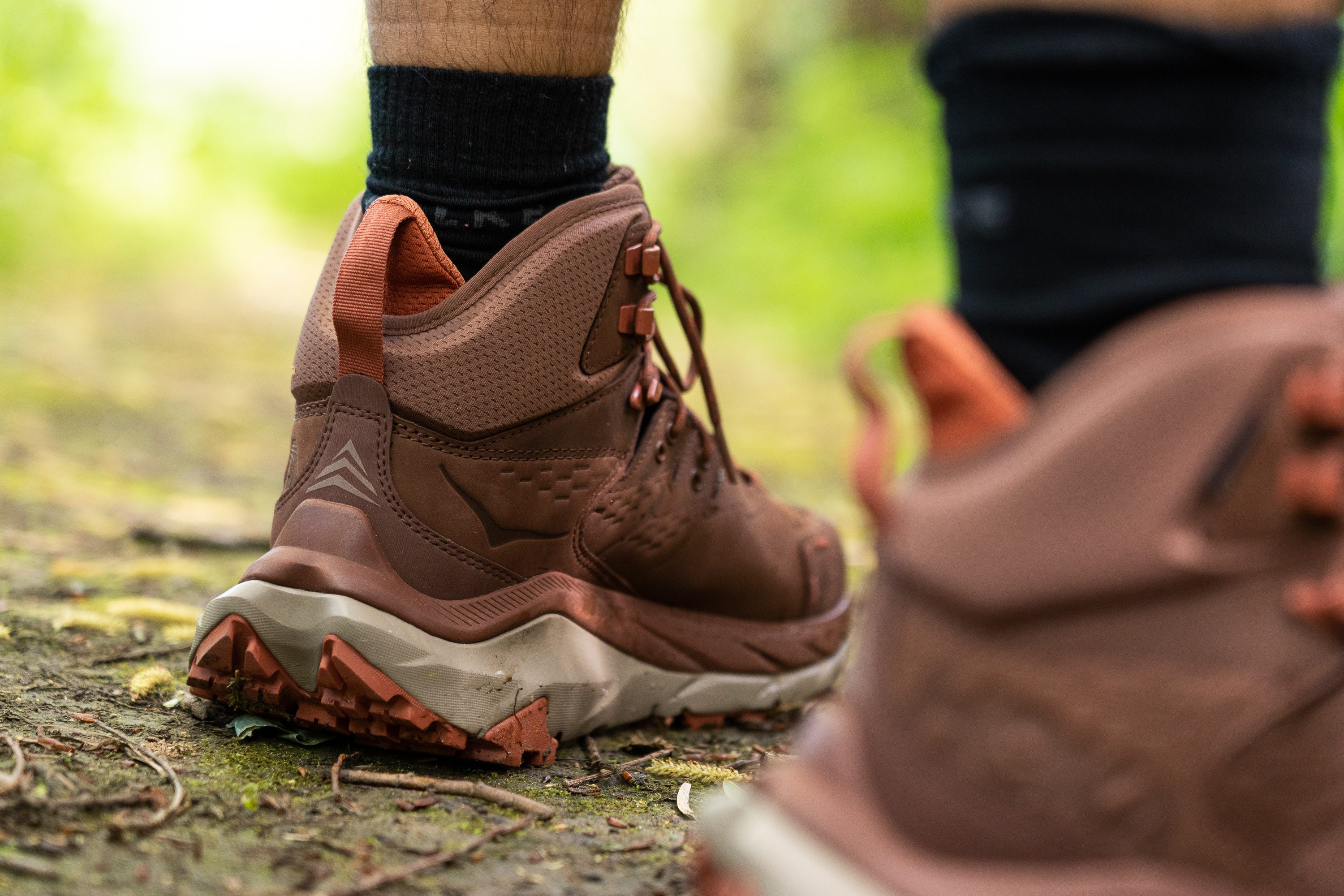
| Hoka Kaha 2 GTX | Finger loop |
Sustainable materials
Hoka is taking some serious steps towards sustainability and it shows in the Kaha 2 GTX as well. The part of recycled polyester in different parts of the boot varies from 50% to 100%. Even the GORE-TEX membrane is made with 71% recycled content.
